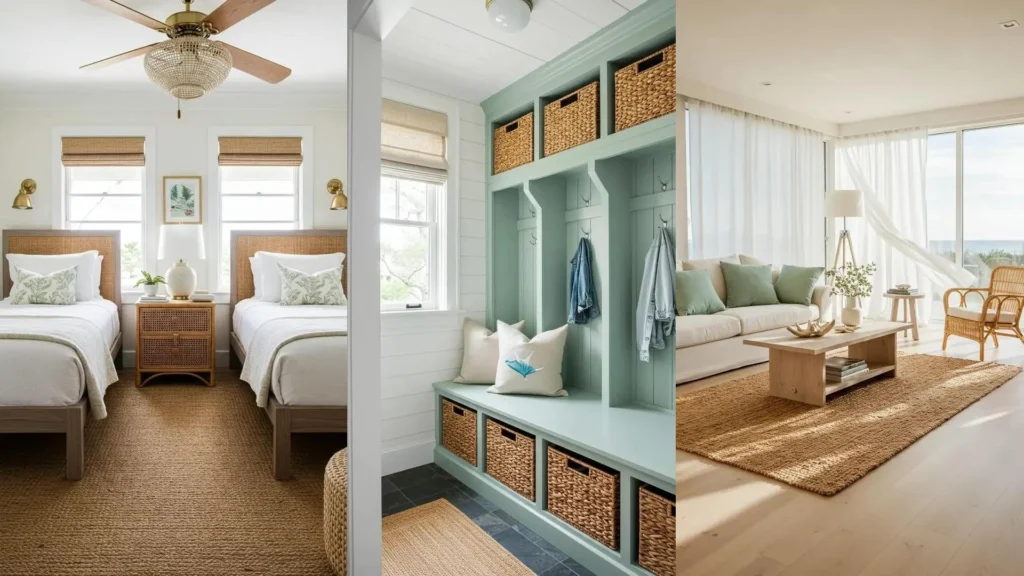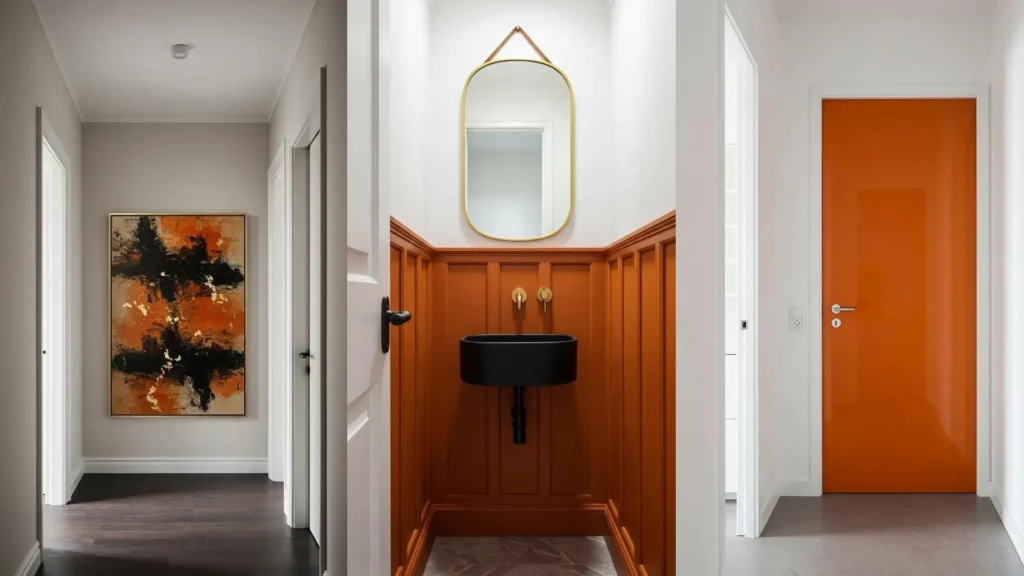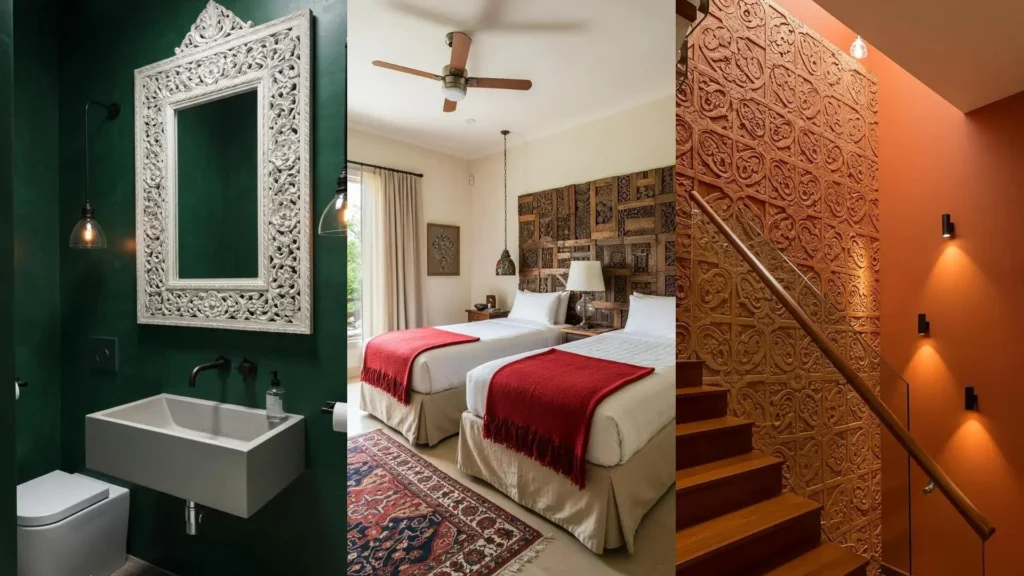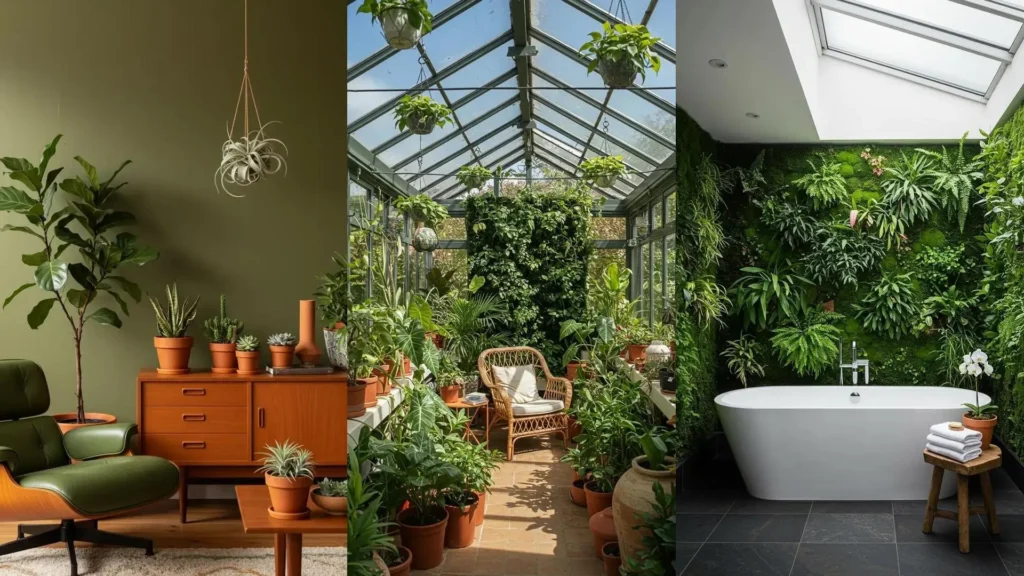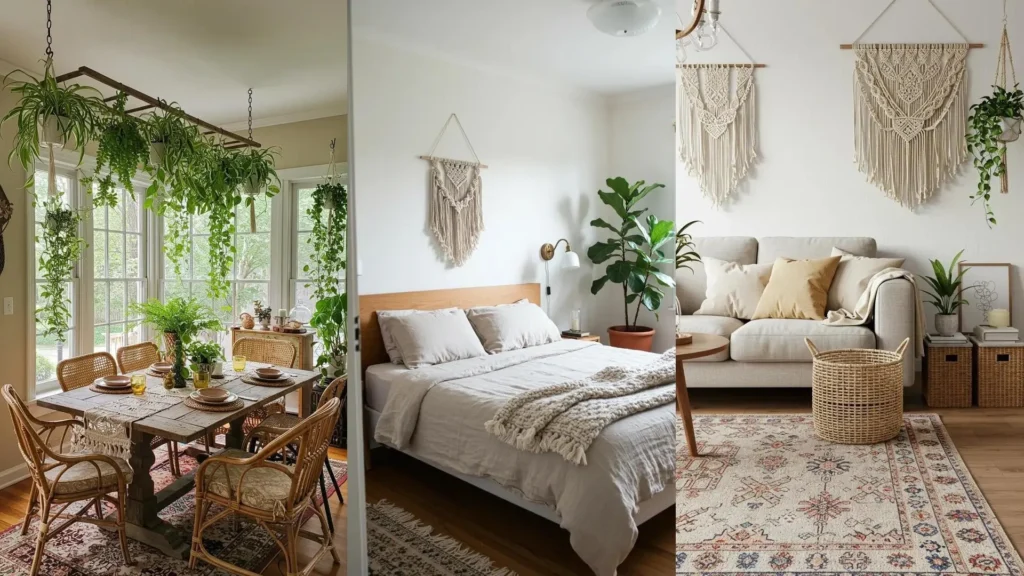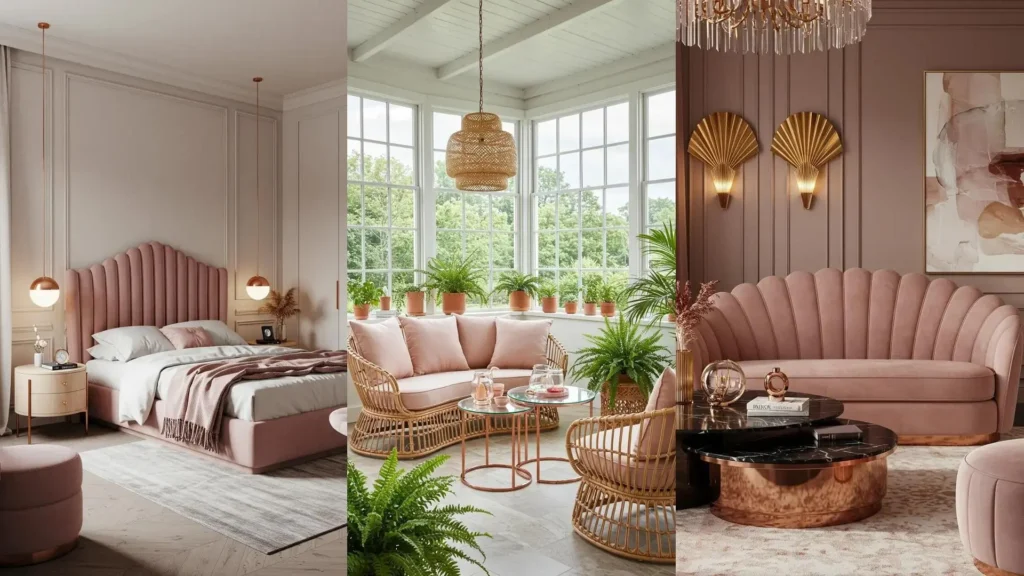A coastal-inspired home is less about a specific location and more about a feeling—one of calm, ease, and a deep connection to the natural world.
It’s about capturing the way sunlight filters through a sheer curtain, the soothing repetition of waves in a deep blue accent, or the grounding texture of sand-colored wood underfoot.
You don’t need an ocean view to evoke this sense of serenity. It’s found in thoughtful choices: balancing crisp whites with organic textures, editing down to what is both beautiful and useful, and creating spaces that allow you to breathe more deeply.
Here are 31 ways to bring that clarity and warmth into your own home, one intentional step at a time.
1. Establish Your Palette with a Focal Point
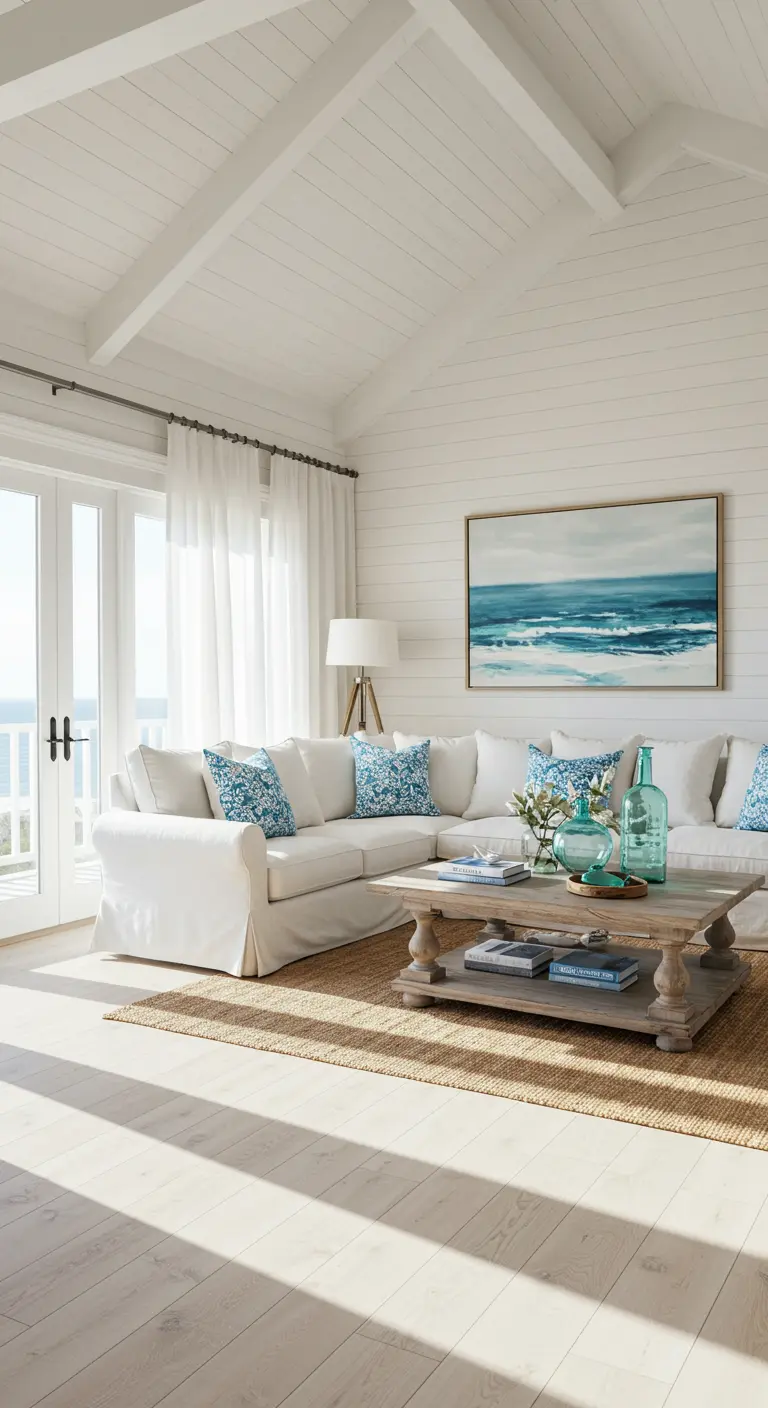
Use one significant piece of art to define your room’s color story.
Here, a large seascape provides the exact shades of blue for throw pillows and accessories, creating instant cohesion.
This makes choosing accent colors feel intentional, not random.
The natural wood of the coffee table and the texture of the jute rug prevent the white and blue from feeling cold.
2. Embrace Minimalist Warmth
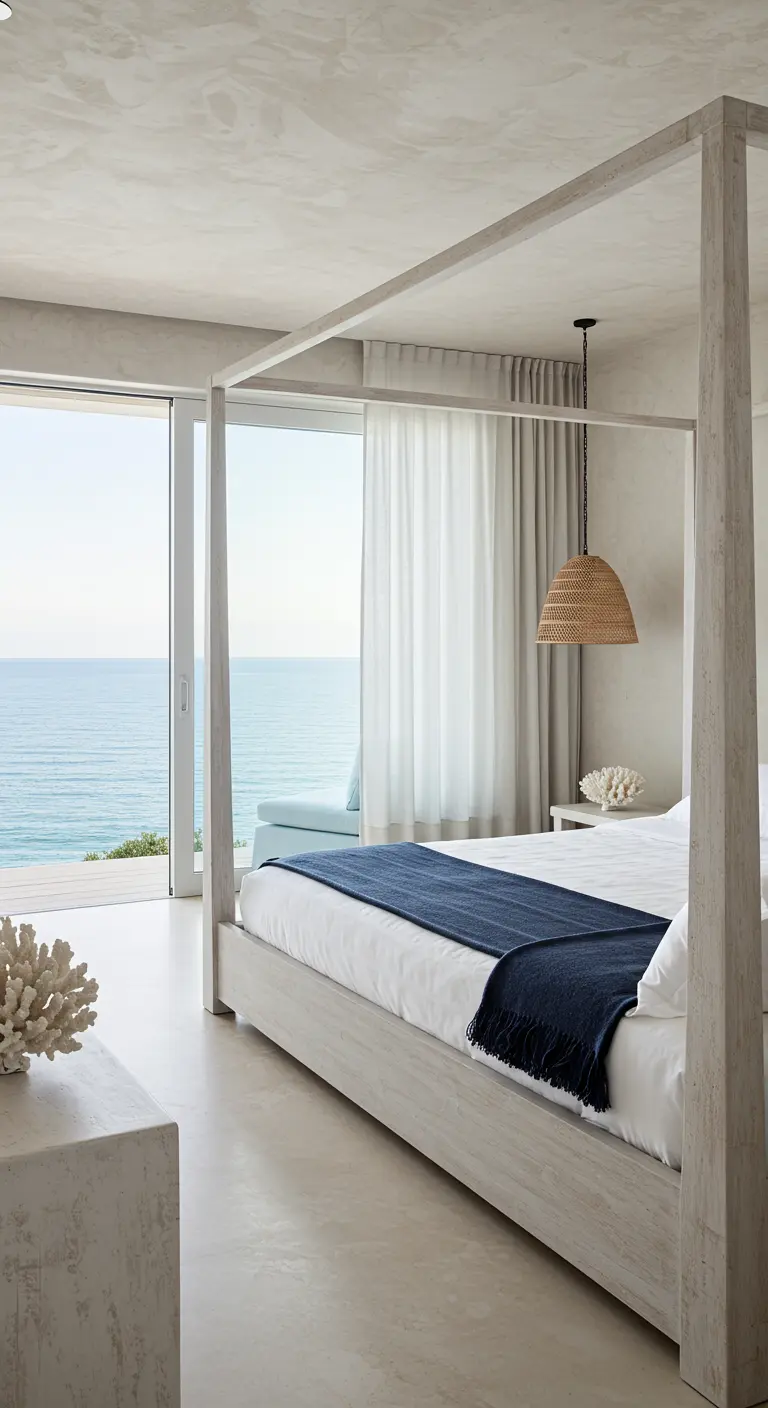
Coastal design doesn’t always mean bright white and clutter.
Create a serene retreat by pairing a minimalist frame, like this bleached wood canopy bed, with a single, deep accent color.
A simple navy throw provides a focal point without overwhelming the space.
The woven pendant light adds a necessary touch of organic texture, keeping the room from feeling stark. Such coastal minimalism creates a calm sanctuary.
3. Introduce Color with a Tiled Backsplash
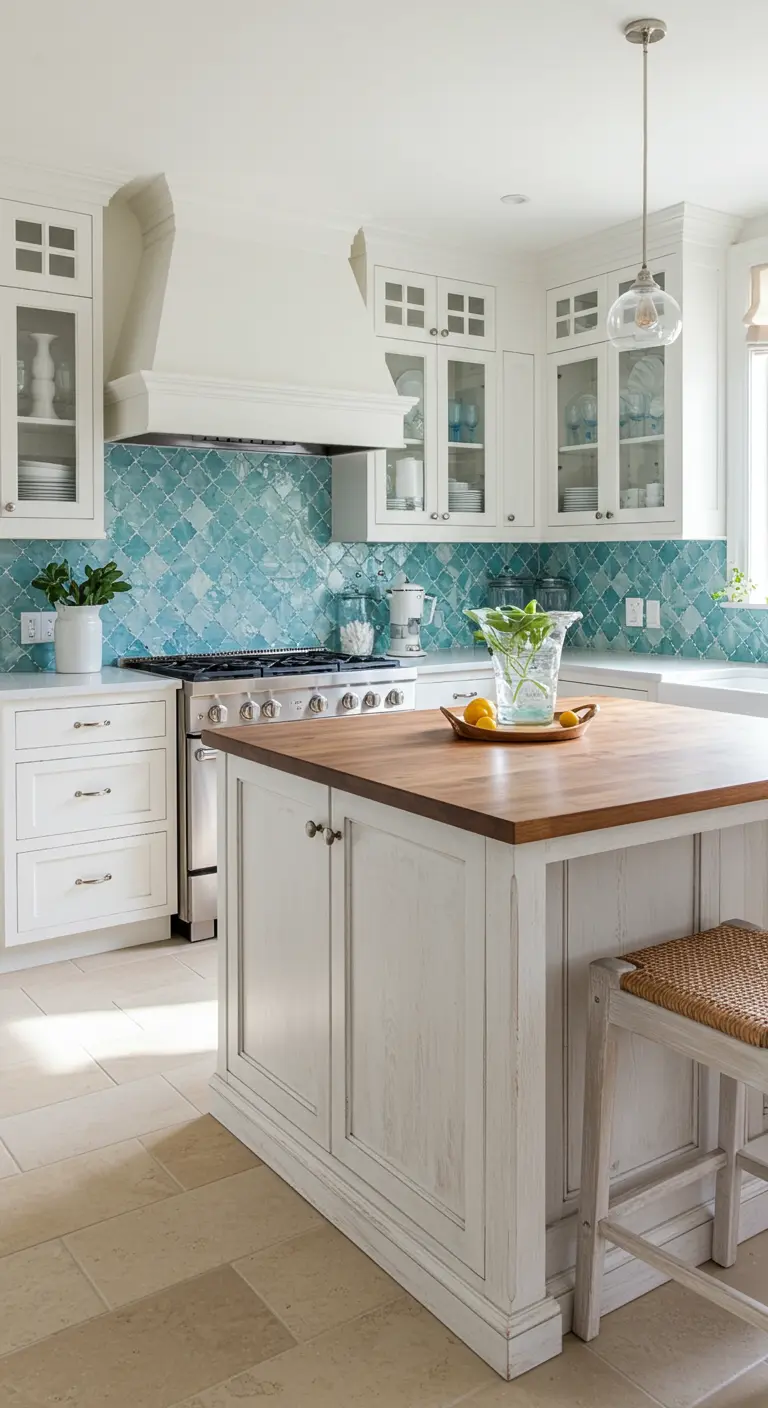
If you’re hesitant to commit to colorful cabinetry, a backsplash is the perfect place for a dose of personality.
A glossy, aquatic-hued tile introduces color and light-reflecting shine without a full renovation.
It instantly elevates standard white cabinets.
Pair it with a wood countertop on your island to add warmth and balance the cool tones. This looks beautiful with soft blue cabinetry as well.
4. Contrast Deep Hues with Natural Textures
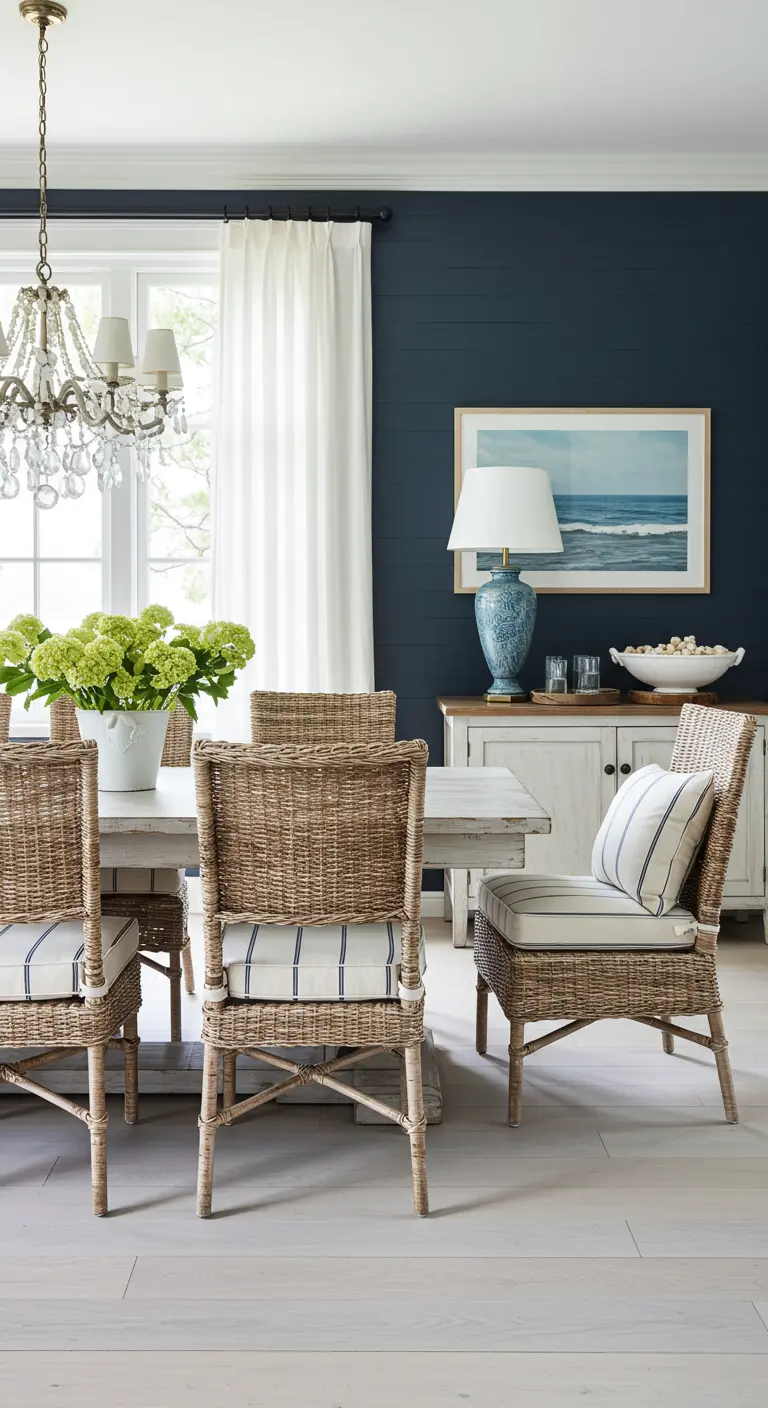
Don’t be afraid of dark, moody colors in a coastal scheme.
A deep navy accent wall creates a sophisticated, intimate backdrop for your dining space.
To keep it from feeling heavy, contrast the dark wall with light, natural materials.
Wicker chairs, a whitewashed table, and crisp white curtains lift the space and provide essential textural balance.
5. Use Tile to Create a Wall of Serene Color
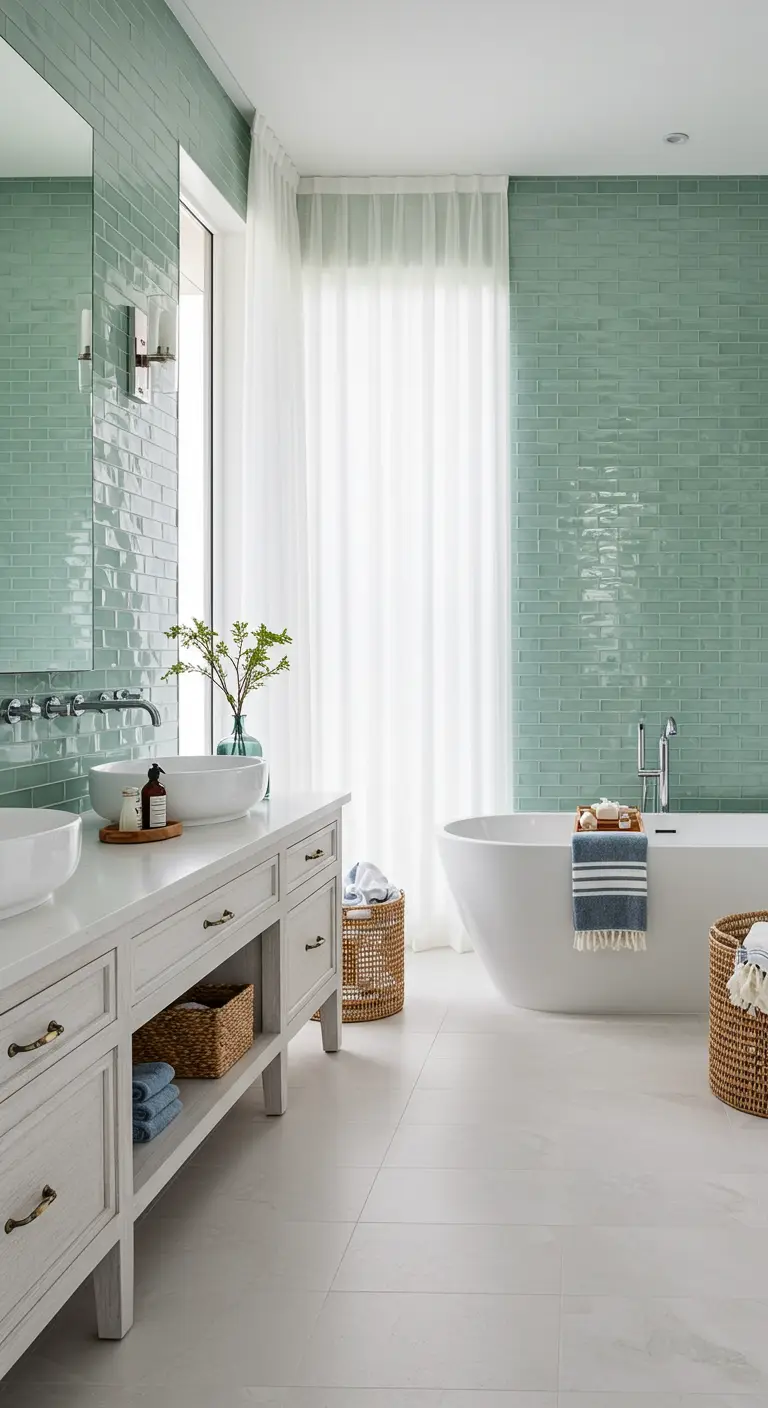
Extend your tile from the vanity backsplash all the way to the ceiling.
Using a single, soft color like this seafoam green across a whole wall creates an immersive, spa-like atmosphere.
The glossy finish bounces light around, making the room feel larger and brighter, while the uniform color is incredibly calming.
It’s a bold move with a serene result, perfect for a tropical oasis bathroom feel.
6. Blur the Lines Between Indoors and Out
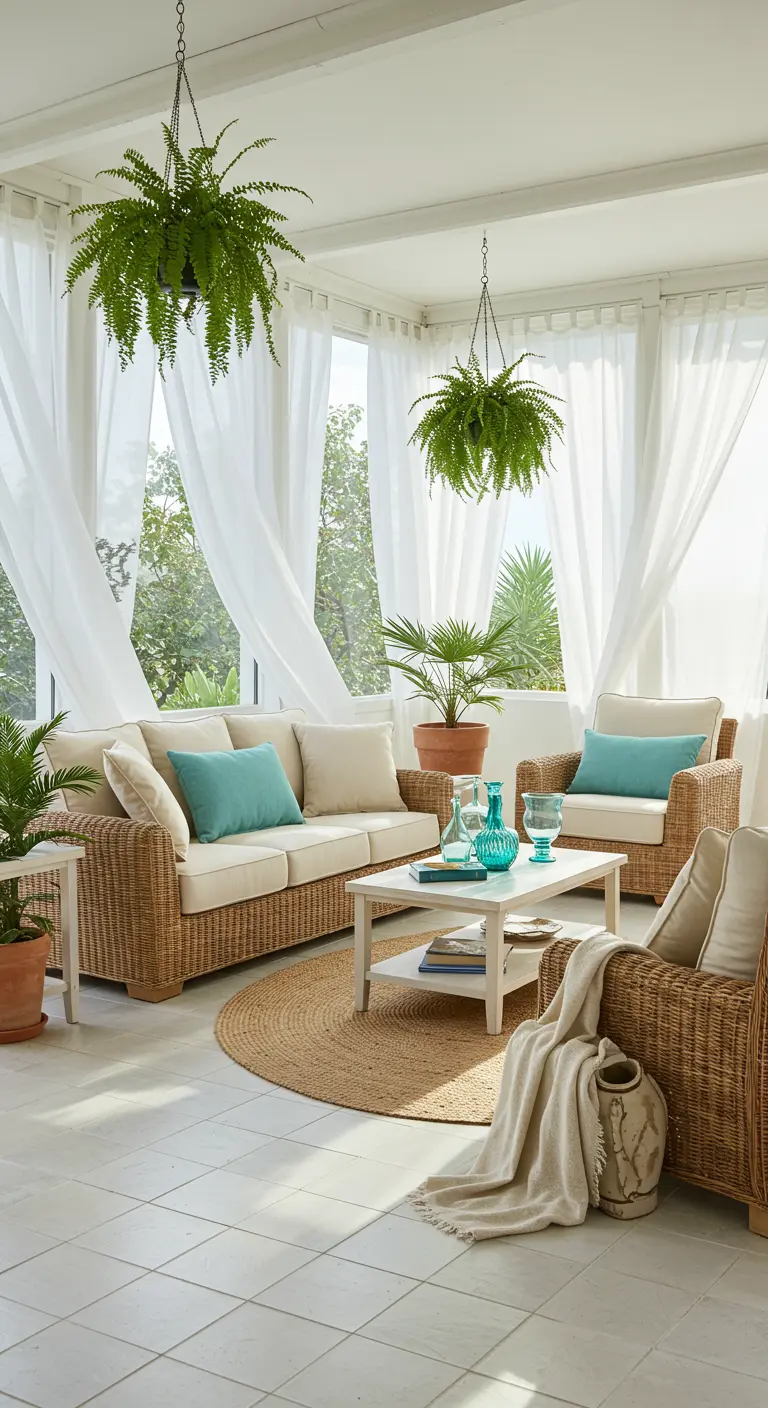
In a sunroom or covered porch, use design to connect with the nature just outside.
Hanging ferns draw the eye upward and add life, while gauzy white curtains diffuse sunlight beautifully, creating a soft glow.
Choose durable, natural materials like wicker and jute that feel at home in both an interior and exterior setting.
This approach, similar to these urban green corners, creates a true transitional space.
7. Frame Your Workspace with Color
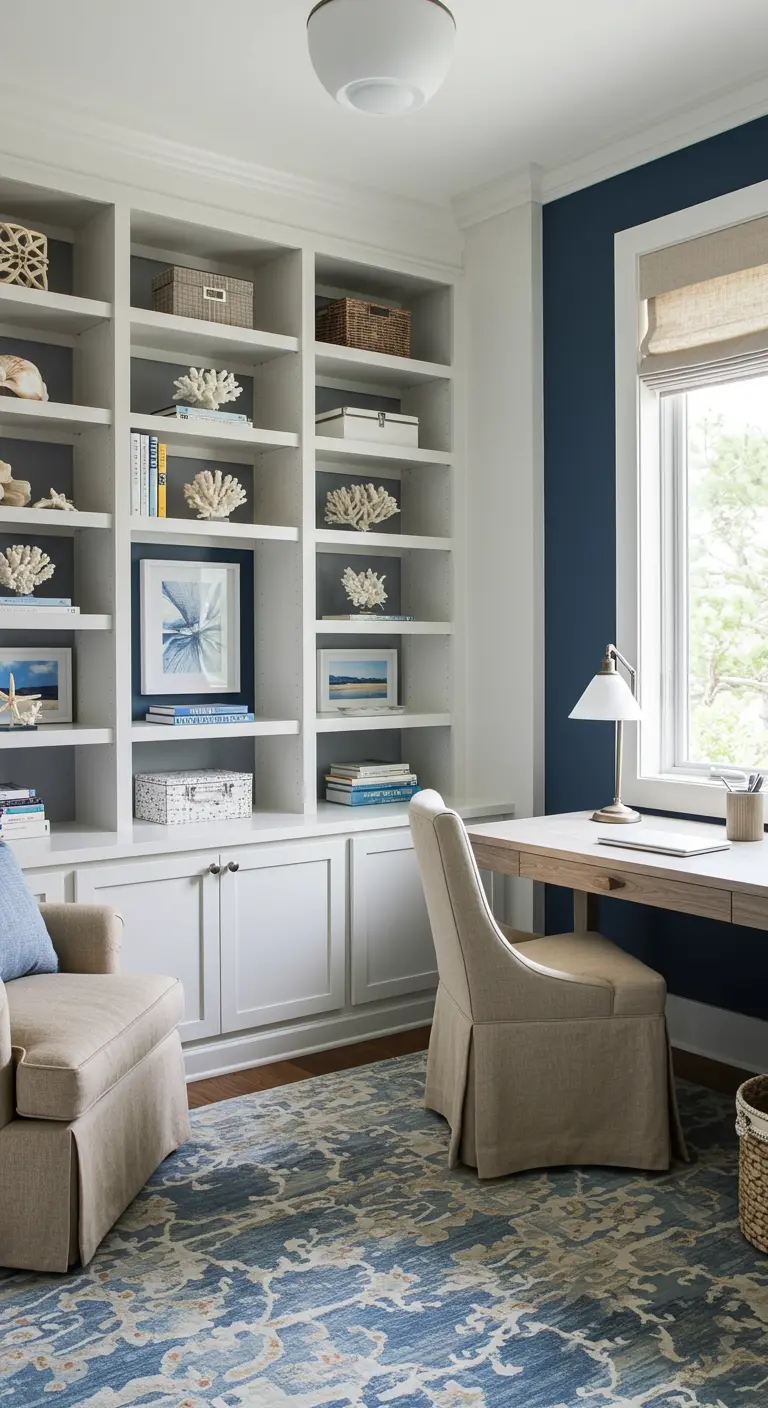
In a room with built-ins, paint the wall behind the desk and window a deep, grounding color.
This technique, known as color blocking, defines the workspace as a distinct zone.
It also makes the view outside the window feel more intentional, like a framed piece of art.
The white shelving keeps the room feeling bright and organized.
8. Create a Welcoming and Functional Entry

Your entryway sets the tone for your entire home.
A large, round mirror is essential—it bounces light and makes the space feel bigger.
Pair it with a slim console table that doesn’t obstruct the walkway.
Symmetrical glass lamps add elegance without visual weight, while a durable, patterned runner introduces color and protects your floors.
9. Soften Hard Surfaces with Chunky Textiles
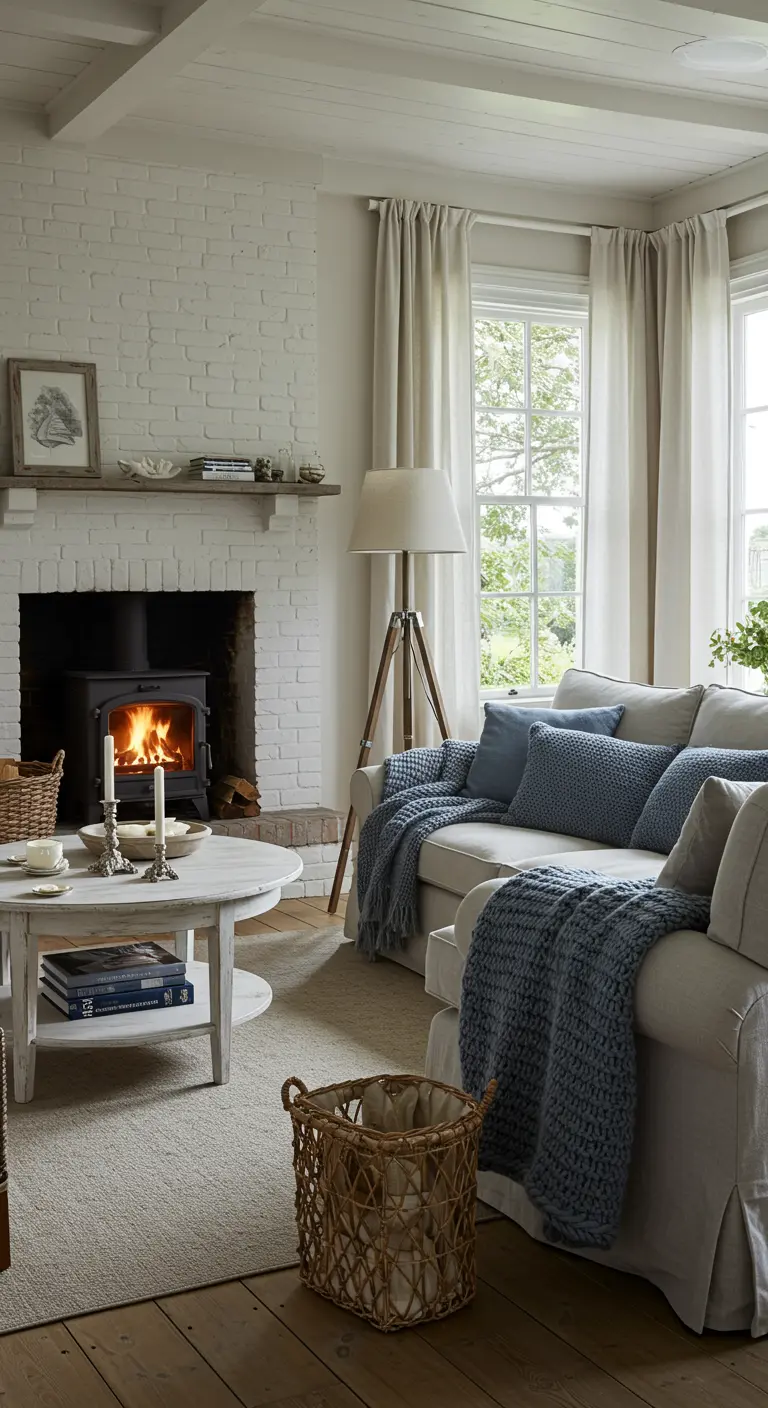
If you have prominent architectural features like a brick fireplace or wood floors, balance their hardness with plush, oversized textiles.
Chunky knit throws and deep, soft cushions invite you to relax.
The contrast in textures—smooth painted brick versus soft, nubby wool—is what makes a room feel layered and thoughtfully designed.
This layering is key in Scandinavian-inspired retreats too.
10. Use Symmetry for a Calm, Composed Look
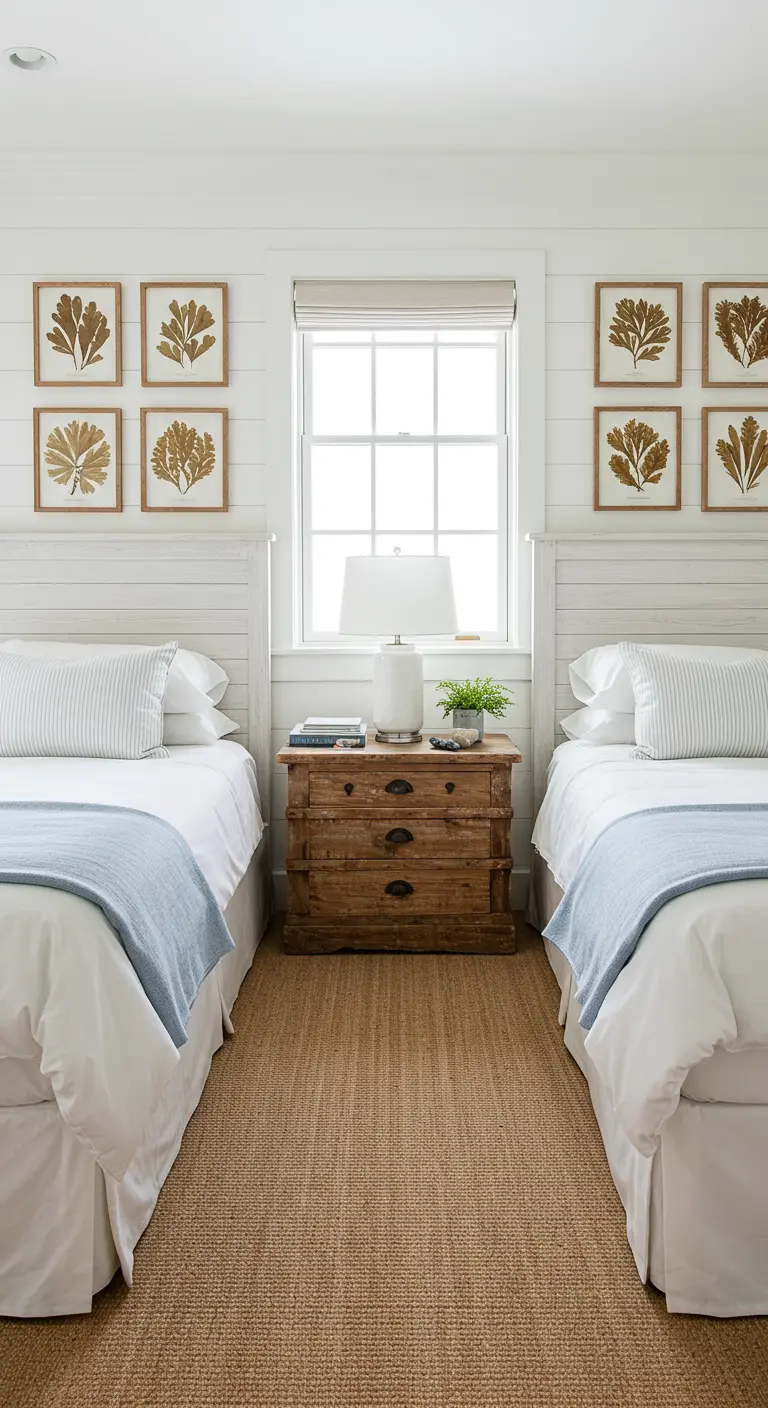
In a shared or guest bedroom, symmetry creates an immediate sense of order and calm.
Arrange twin beds with identical bedding and lighting.
Flank a central feature, like a window or a piece of furniture, with matching sets of artwork.
Here, the grid of framed seaweed prints gives the room a polished, hotel-like feel while reinforcing the coastal theme.
11. Maximize Your Corner with a Built-In Nook
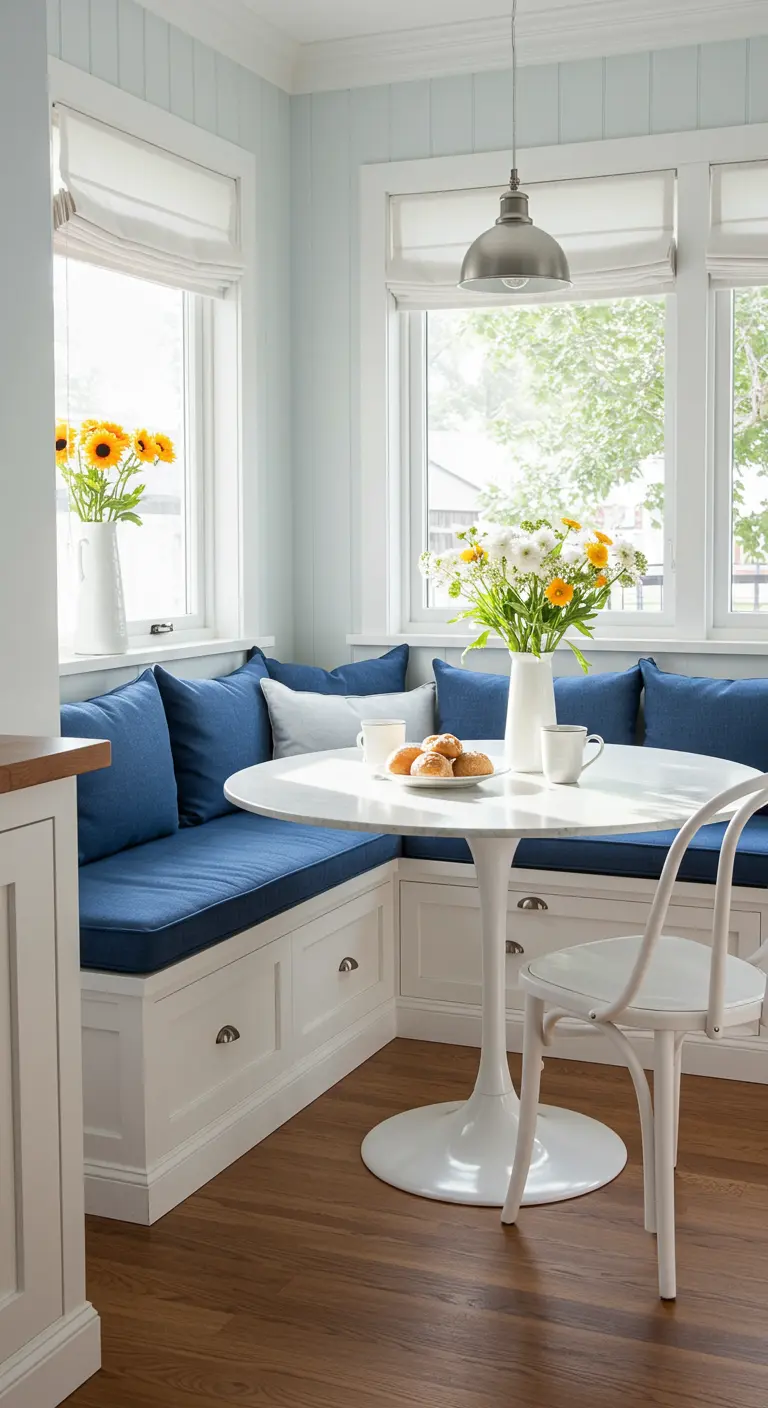
Turn an underused corner into your home’s most charming spot with a built-in banquette.
It provides more seating than a standard table and chairs and offers an opportunity for hidden storage in the base.
Choose a durable, deep blue fabric for the cushions to hide spills and add a classic nautical touch.
A round pedestal table is key—it makes sliding in and out easy.
12. Modernize Paneling with Vertical Lines
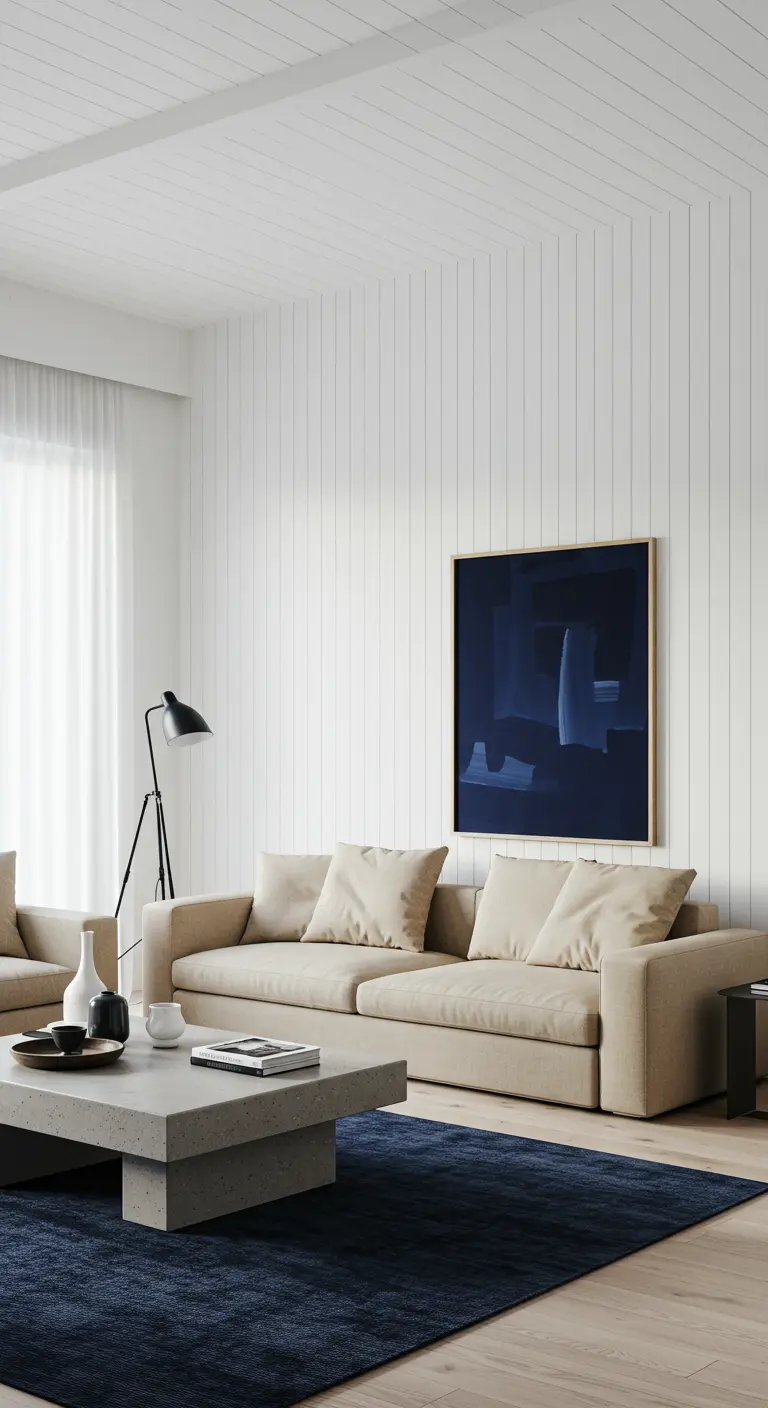
For a more contemporary take on coastal paneling, install boards vertically instead of horizontally.
This draws the eye upward, making ceilings feel higher.
Paired with clean-lined furniture, a blocky concrete coffee table, and a deep navy rug, the look is less cottage and more modern art gallery.
It’s a sophisticated twist on a classic texture, perfect for luxe, contemporary spaces.
13. Mix Rustic Wood with Modern Fixtures
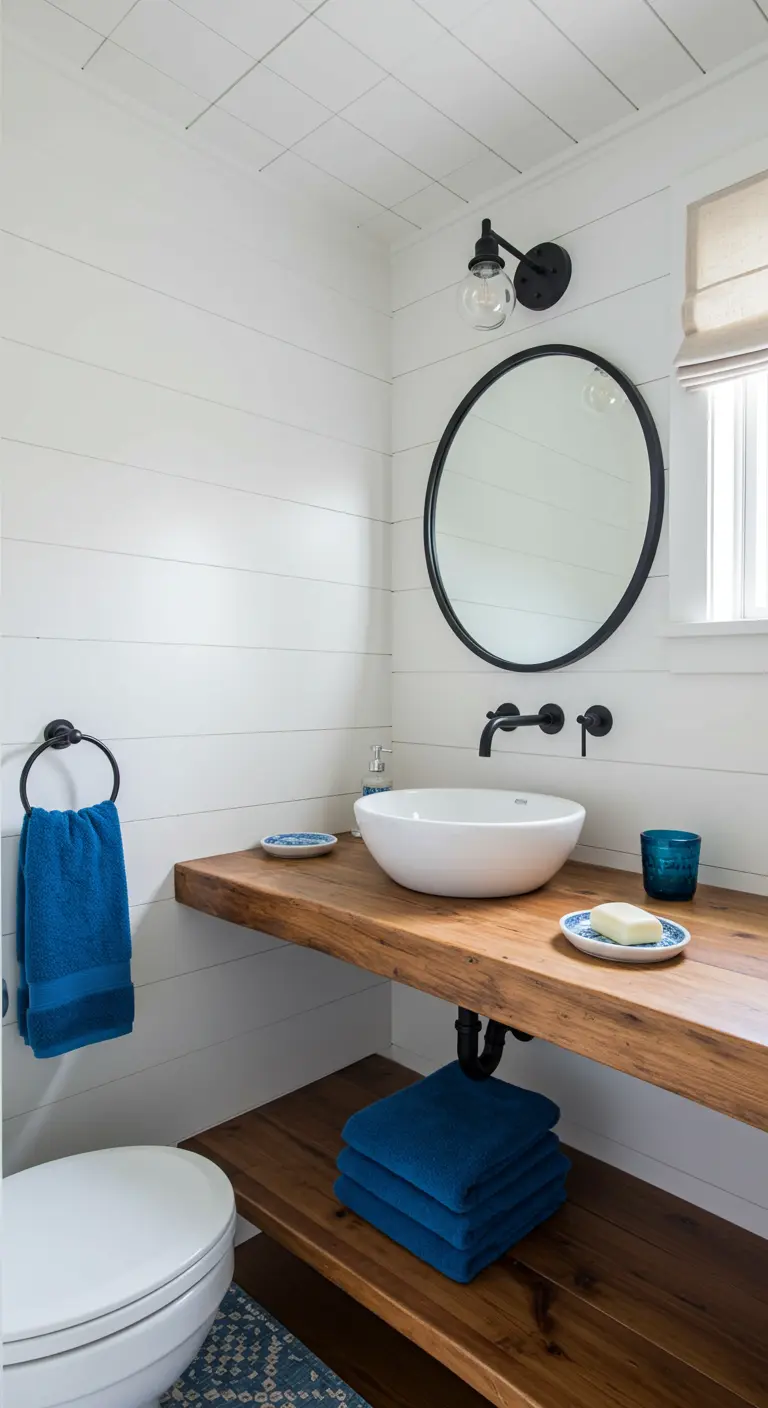
Create compelling contrast in a small space like a powder room.
Pair a rustic, live-edge wood vanity with sleek, matte black fixtures.
The warmth and organic grain of the wood prevent the modern hardware from feeling cold or industrial.
It’s a design trick that feels custom and elevated, even in a compact room.
14. Anchor Your Kitchen with a Colored Island
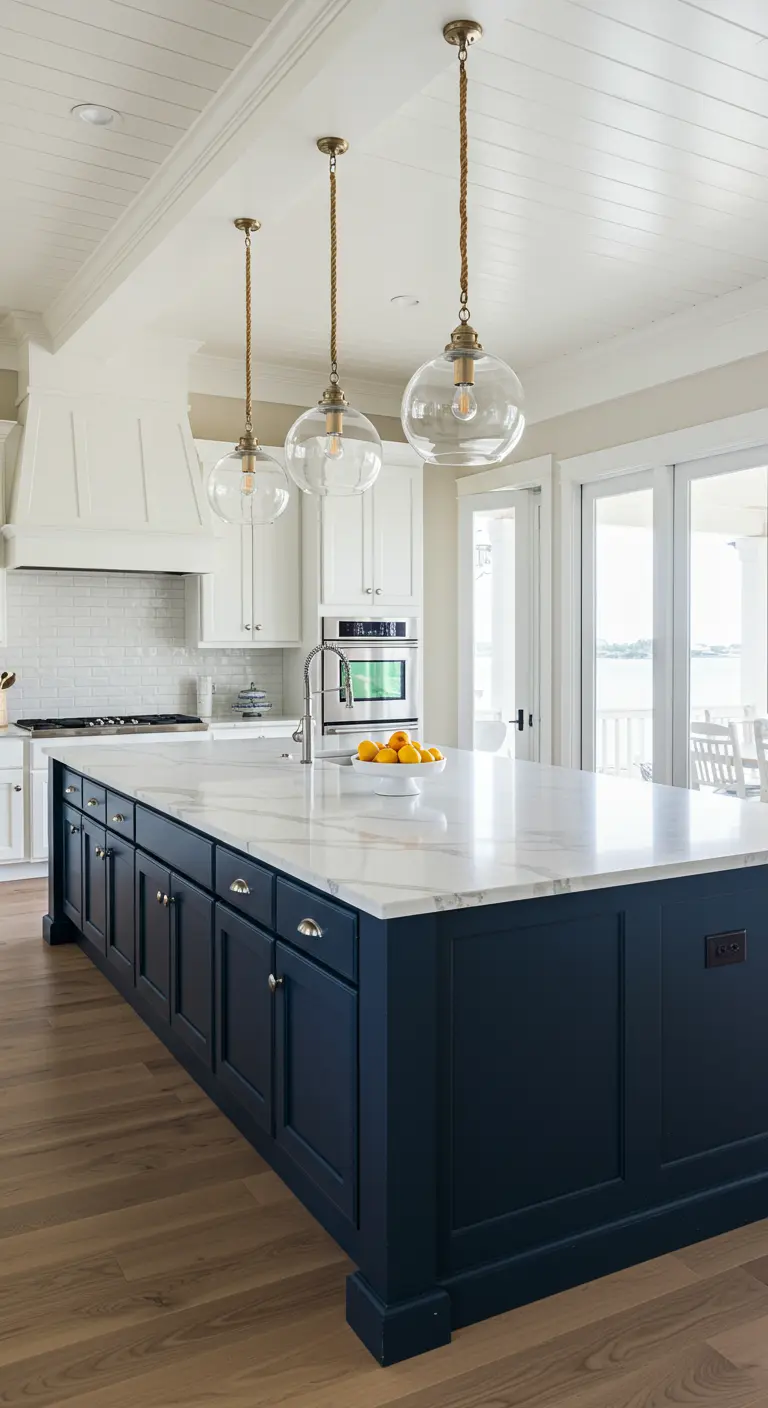
If you want to introduce a strong color without overwhelming your kitchen, paint just the island.
A deep navy blue acts as a sophisticated anchor in an otherwise all-white space.
It grounds the room and makes the marble or quartz countertop appear even brighter.
Oversized glass pendant lights keep the look airy and open.
15. Cocoon a Room in Whitewashed Wood
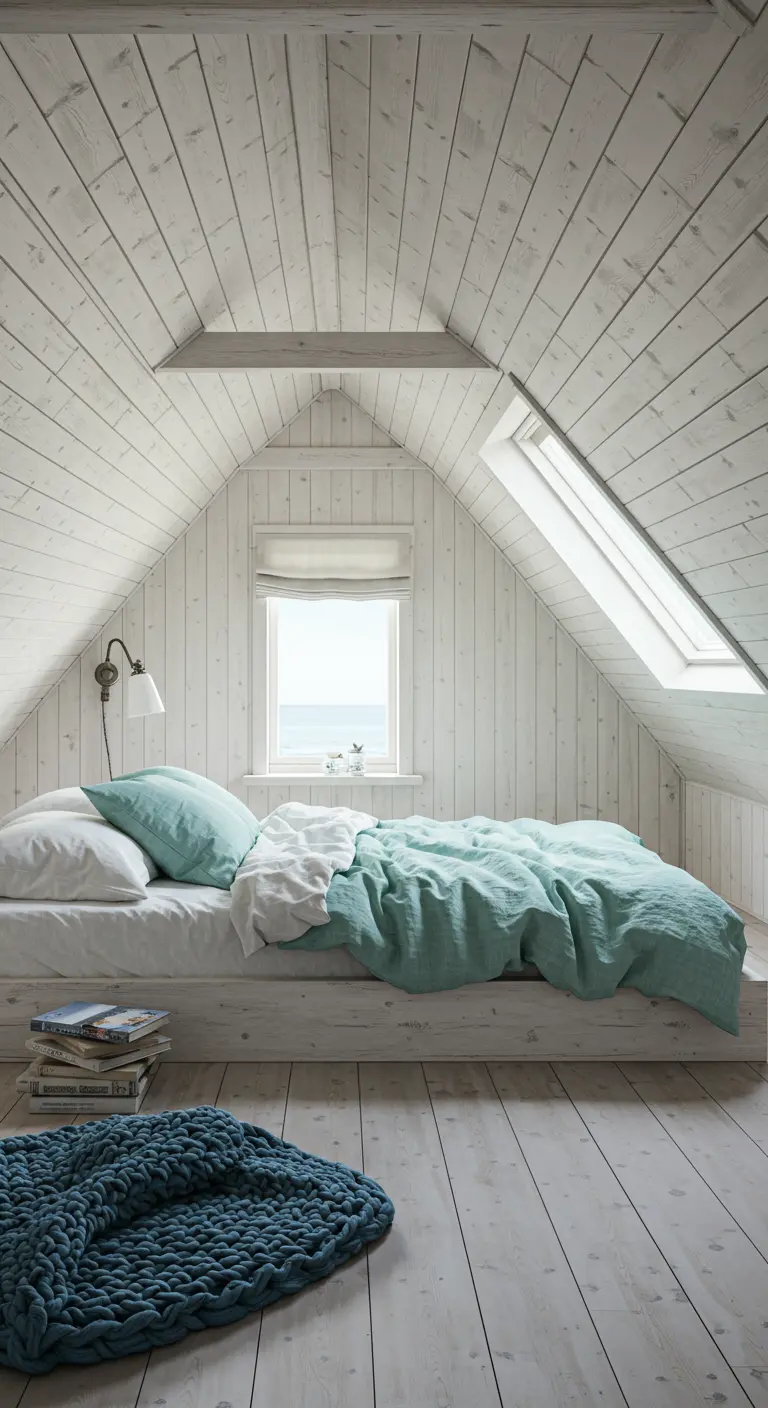
In an attic or a room with slanted ceilings, embrace the architecture by cladding every surface—walls, floor, and ceiling—in the same material.
Whitewashed wood planks create a bright, cozy, and cohesive feel, like the inside of a ship’s cabin.
Keep furnishings low to the ground to maximize the sense of height.
16. Unify a Combined Living and Dining Space
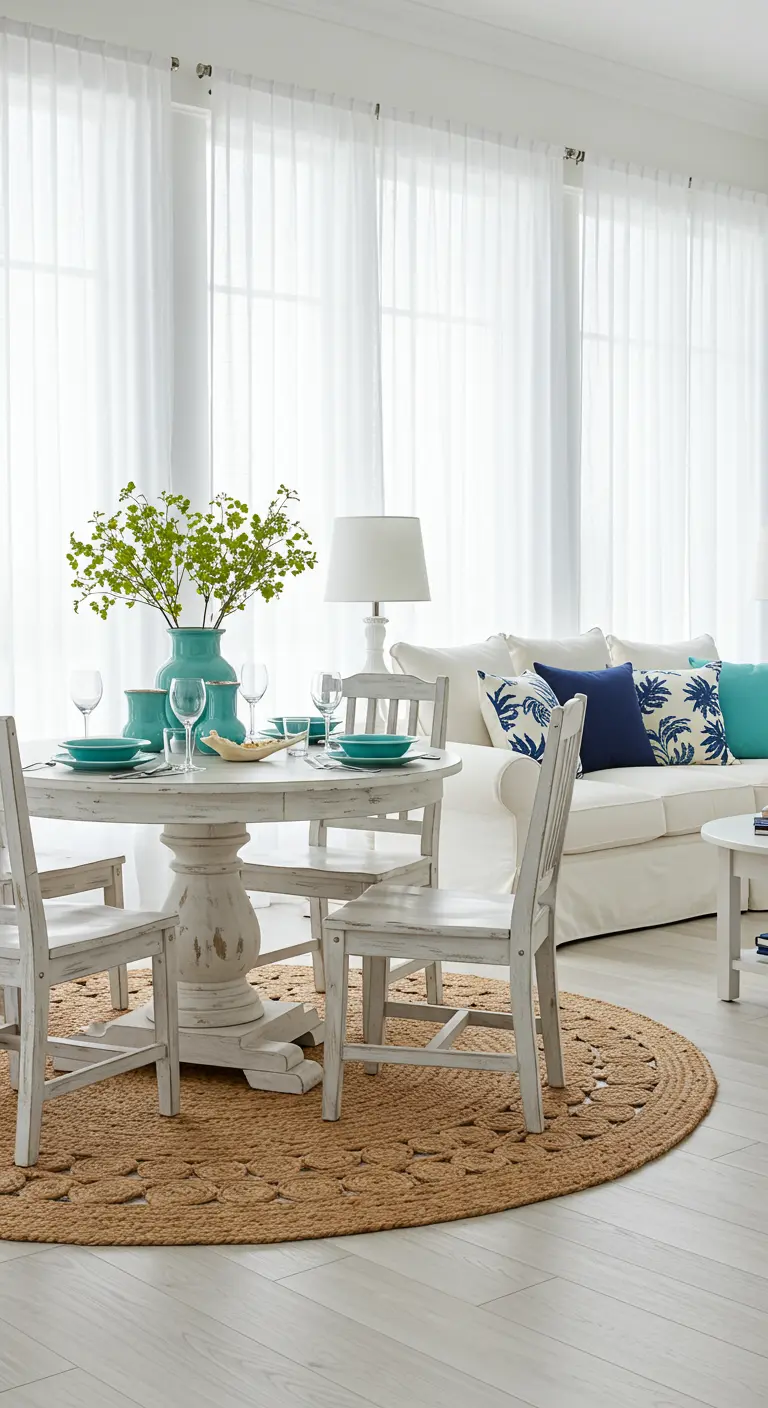
In an open-plan area, use color and texture to connect the different zones.
A large jute rug defines the dining space while tying into other natural textures in the room.
By keeping the furniture finishes consistent—here, distressed white for both the dining set and coffee table—and using the same accent blues throughout, the entire area feels harmonious.
17. Carve Out a Corner with Key Pieces
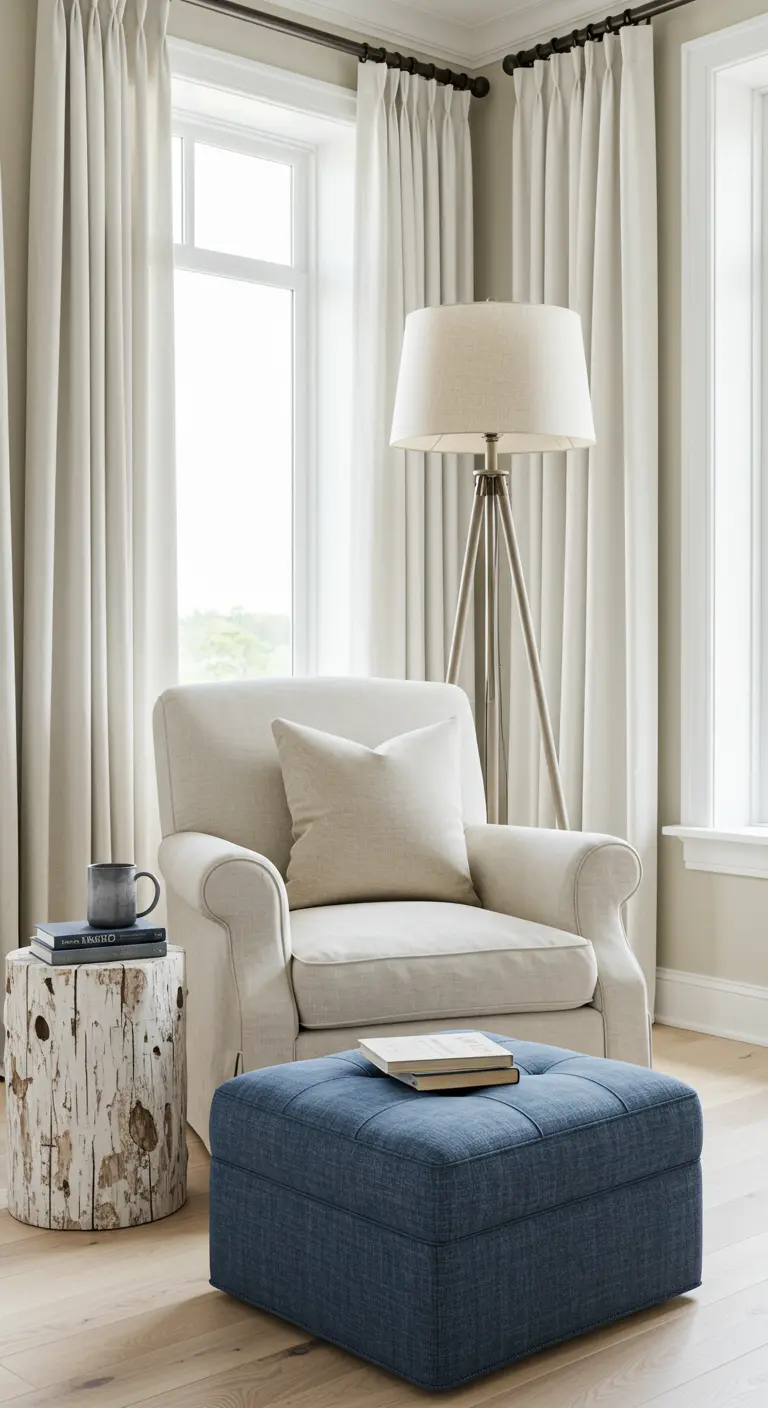
You don’t need a separate room to create a quiet reading spot.
Designate a corner with three essential elements: a comfortable chair, a place to put your feet up, and a task light.
A textured ottoman adds a block of color, while a natural element like a birch log side table brings an organic, sculptural touch.
This cozy corner is a perfect example of intentional design.
18. Layer Textures for a Bohemian Feel
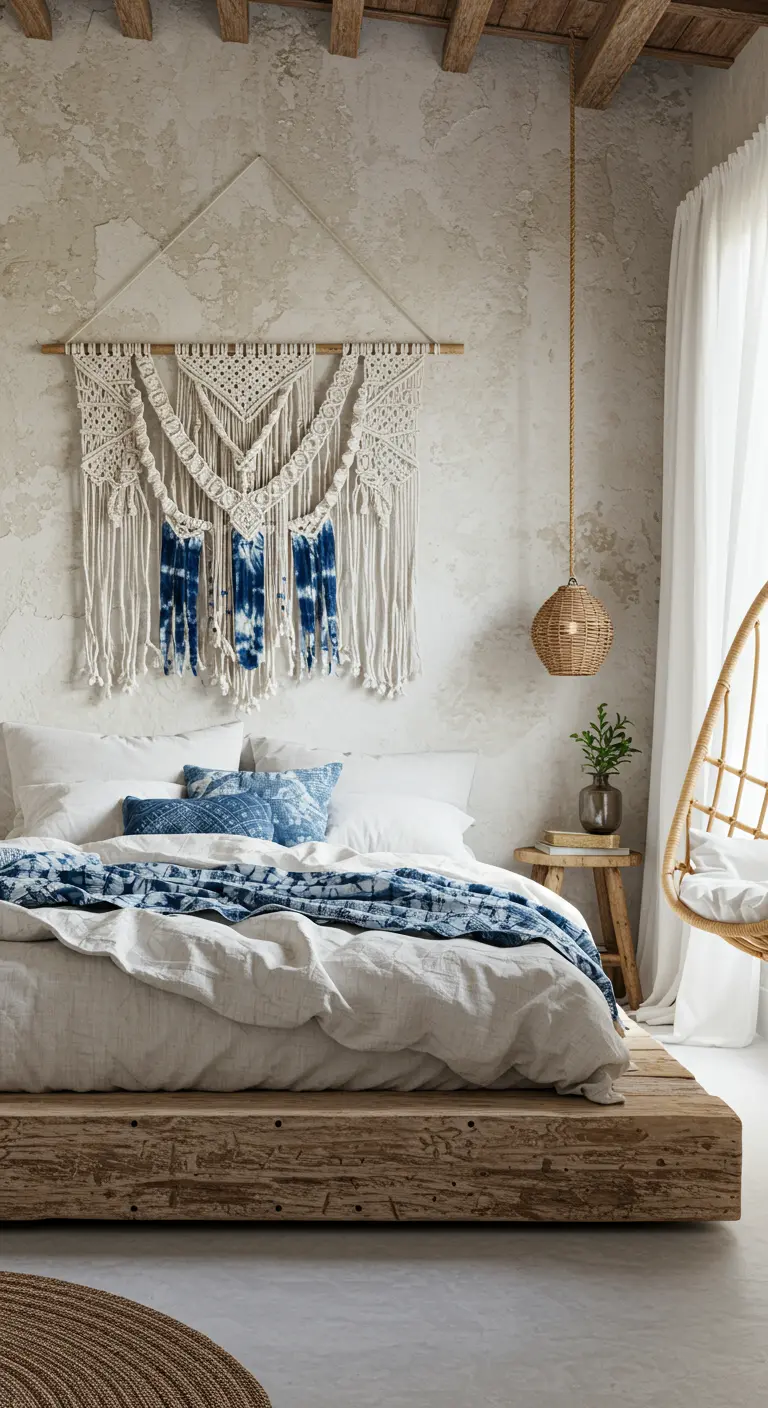
Introduce a more free-spirited, bohemian coastal vibe through layered, handmade textures.
A large macrame wall hanging provides a soft, artistic focal point above the bed.
Pair it with Shibori or tie-dyed textiles and a low, rustic wood bed frame.
The key is mixing different woven and knotted materials—from the wall art to the rattan chair—for a rich, tactile experience. This is a great look for eclectic home designs.
19. Ground a Grand Space with a Substantial Rug
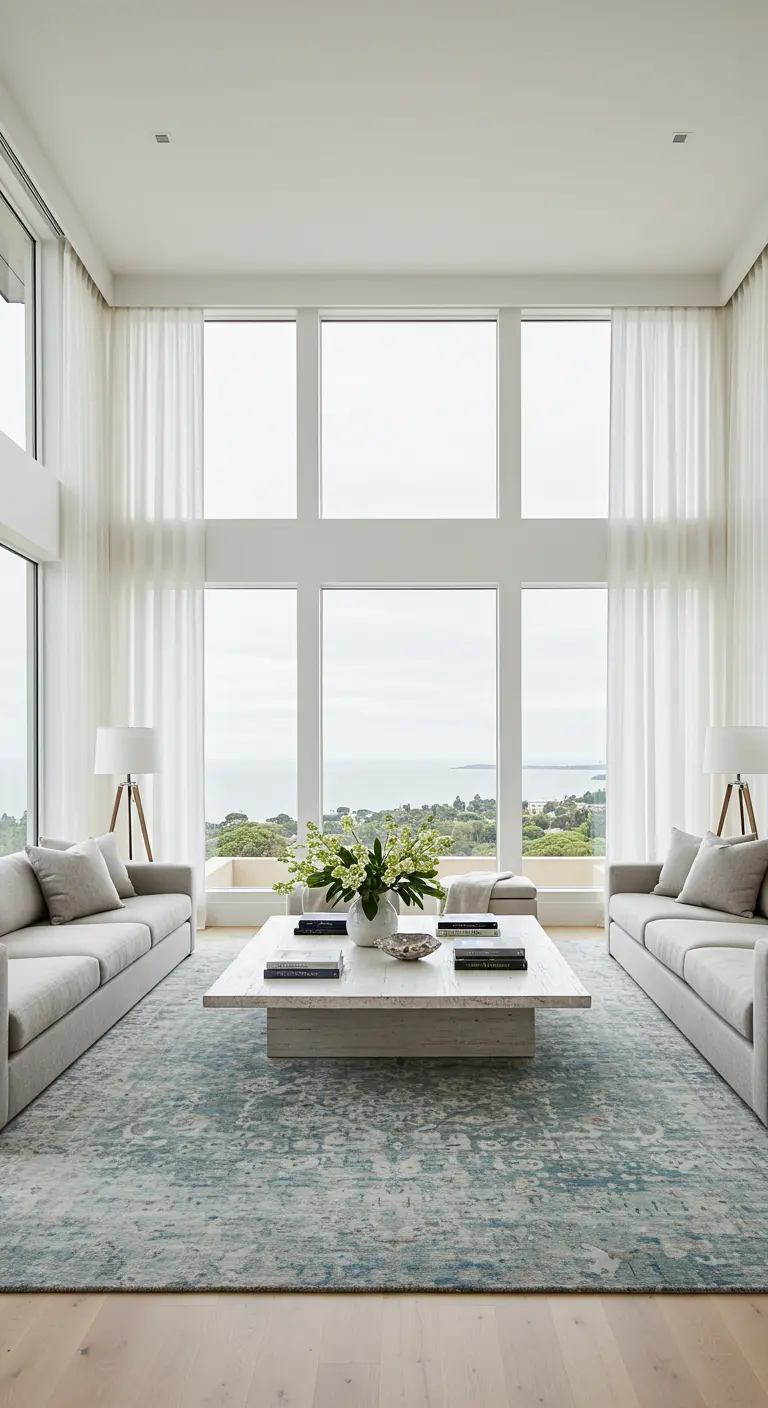
In a room with high ceilings and large windows, furniture can feel like it’s floating.
An oversized area rug is the single most important element for grounding the space.
Choose one that is large enough for all the main furniture to sit on it completely.
This visually connects the pieces and creates a defined, intimate conversation area within the larger room.
20. Treat Open Shelving as a Curated Display
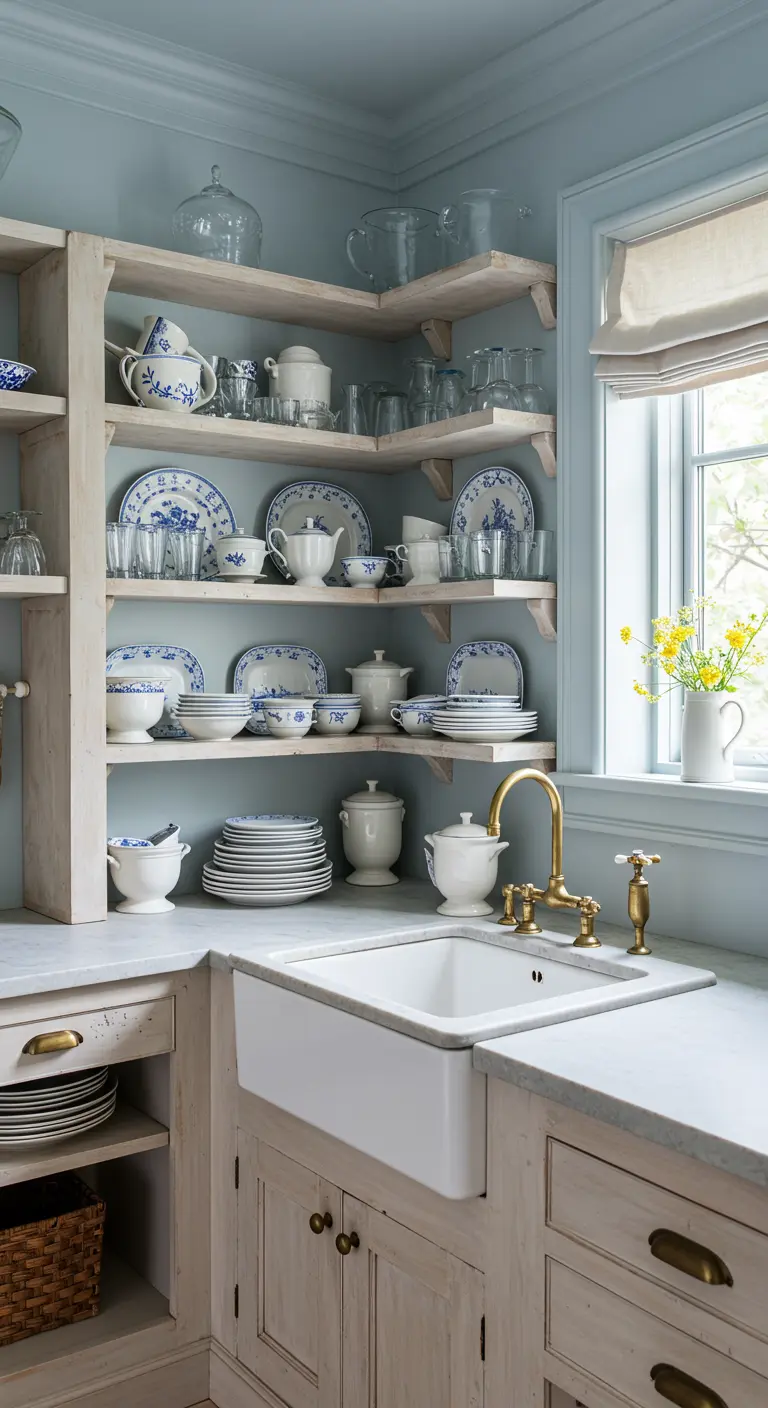
Open shelving forces you to be intentional.
Instead of hiding mismatched items, use it to display a cohesive collection, like blue-and-white porcelain.
Sticking to a strict two-color palette creates a look that is both personal and incredibly tidy.
The warm brass of the faucet provides a beautiful, timeless contrast against the cool tones of the china and walls. For more ideas, explore these enchanted library themes.
21. Commission a Statement Mural
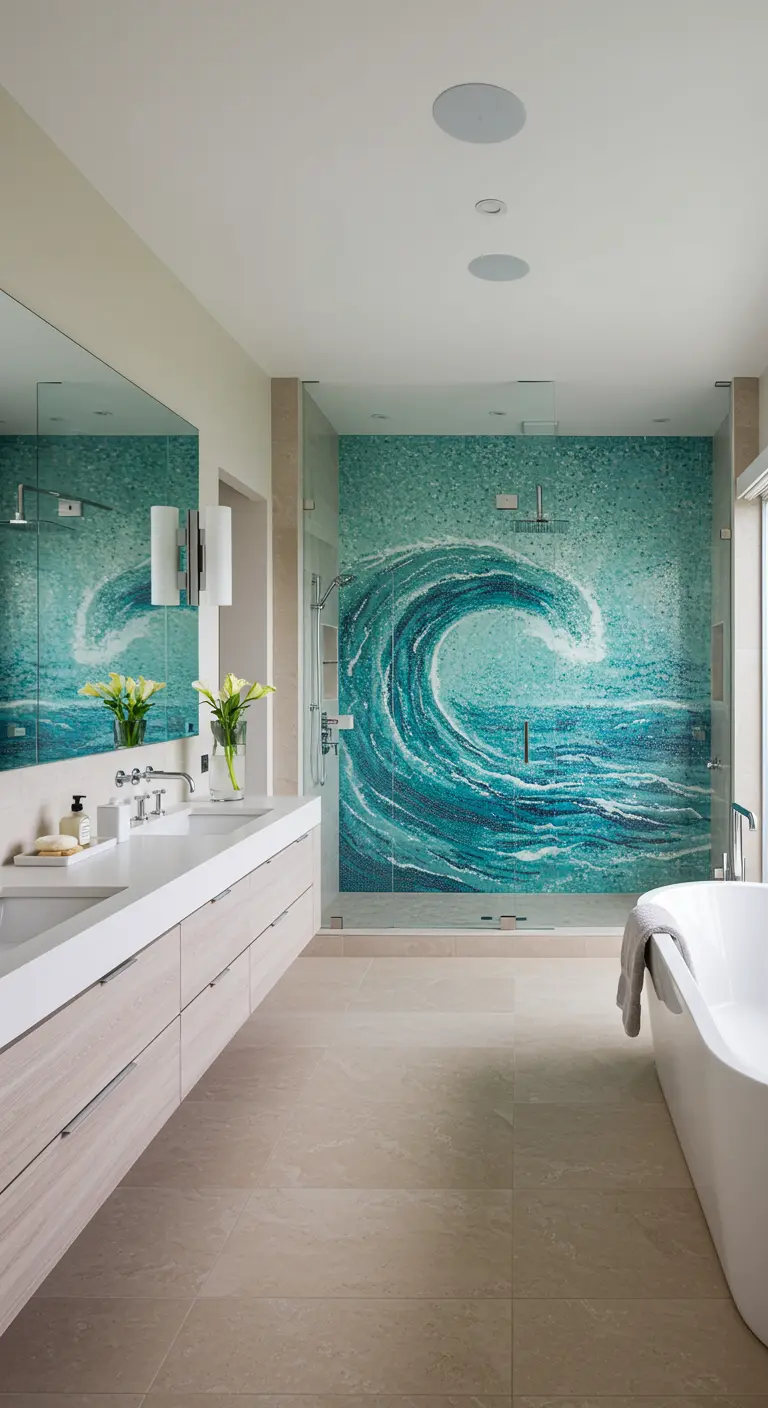
For a truly one-of-a-kind space, go beyond standard tile and commission a mosaic mural.
In a bathroom, a flowing, abstract wave design is a spectacular way to bring the spirit of the ocean inside.
Keep the rest of the room’s finishes simple and neutral to let the artwork be the undisputed star.
This is the ultimate expression of personal style, similar to these bold color-blocked bathrooms.
22. Lead the Eye with a Runner and Gallery Wall
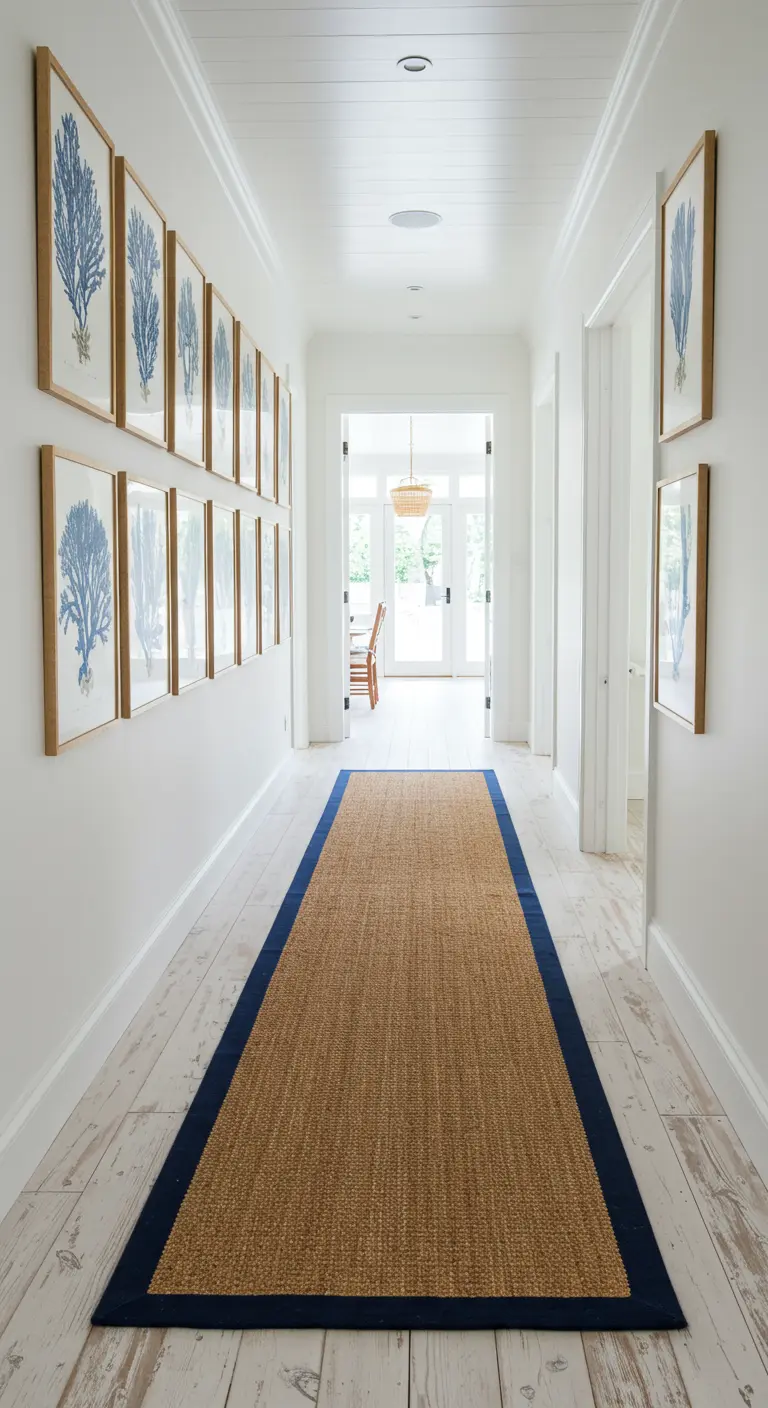
Transform a functional hallway into a beautiful gallery.
A long runner visually lengthens the space and draws you forward.
Echo its linear quality on the walls with a tightly organized gallery of identically framed prints.
This repetition creates rhythm and a strong sense of direction, making the journey through the space a deliberate design experience.
23. Focus on Texture Over Color
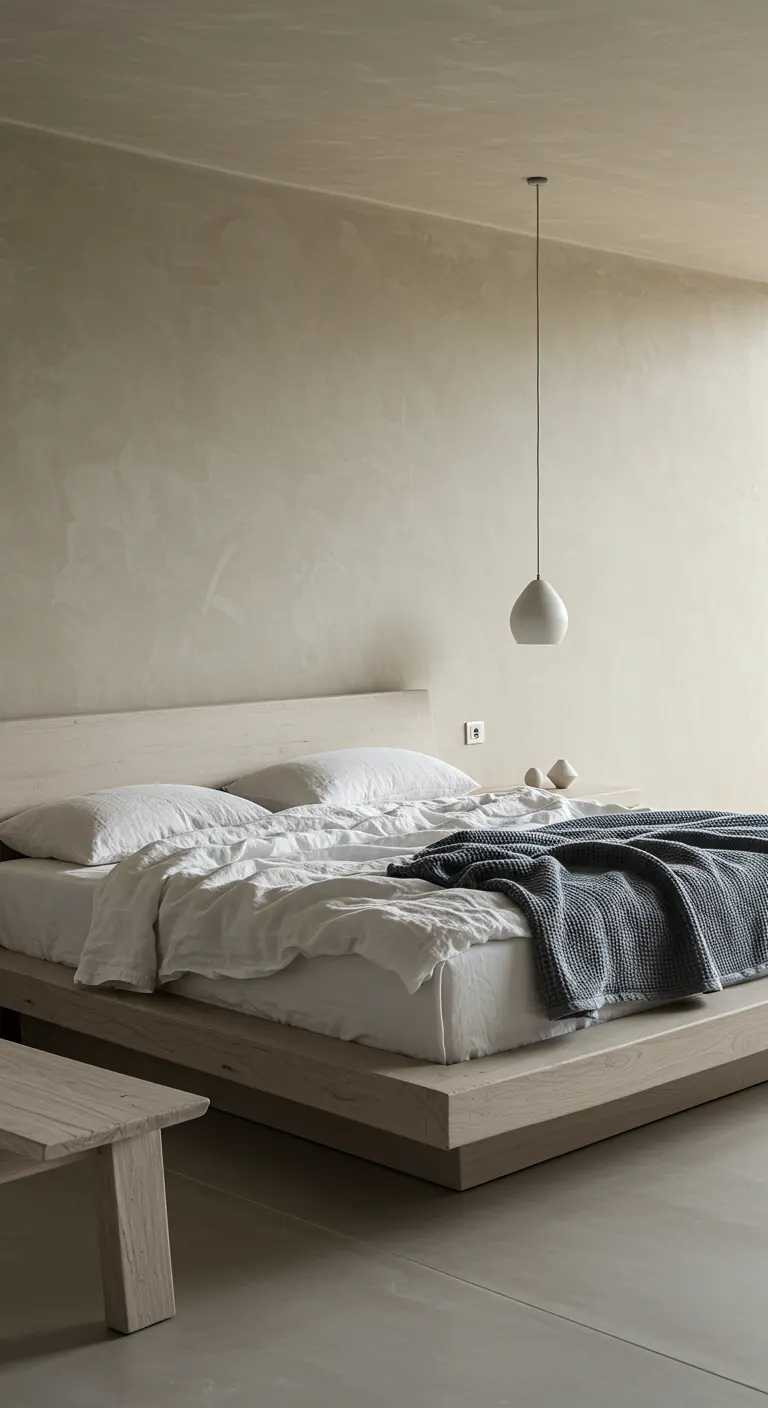
Create a deeply calming bedroom by building a palette based on texture, not color.
Walls with a hand-troweled plaster or limewash finish have a soft, chalky depth that paint can’t replicate.
Pair them with layers of natural linen bedding and a simple wood bed frame.
In this quiet environment, the subtle variations in texture become the main event. This approach feels very similar to subtle neutralscape design.
24. Choose Practical and Accessible Storage

Good design must be livable.
In a family space, incorporate stylish yet accessible storage.
Low-profile consoles with open cubbies and woven baskets are perfect for stowing toys and blankets.
The baskets add valuable texture and keep clutter out of sight, but are easy for everyone to use.
It’s the key to maintaining a calm, organized room.
25. Elevate Dining with Upholstered Chairs
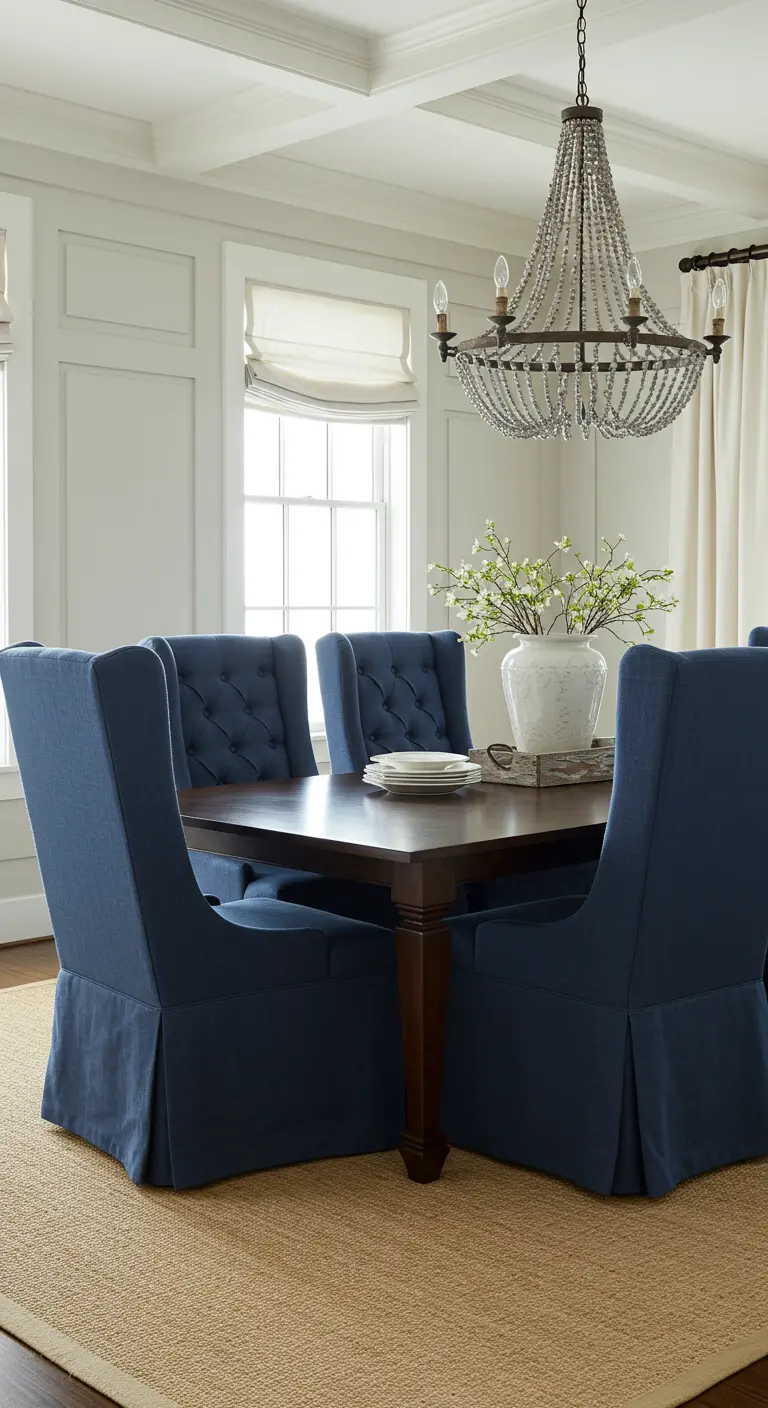
Swap out hard wooden dining chairs for fully upholstered, slipcovered ones.
They instantly make a dining room feel more luxurious and comfortable, encouraging guests to linger.
A deep navy fabric is both classic and practical, while the tufting detail adds a touch of traditional elegance.
Paired with a beaded chandelier, the effect is sophisticated yet relaxed, much like these hygge dining rooms.
26. Create an Outdoor Room with Drapery
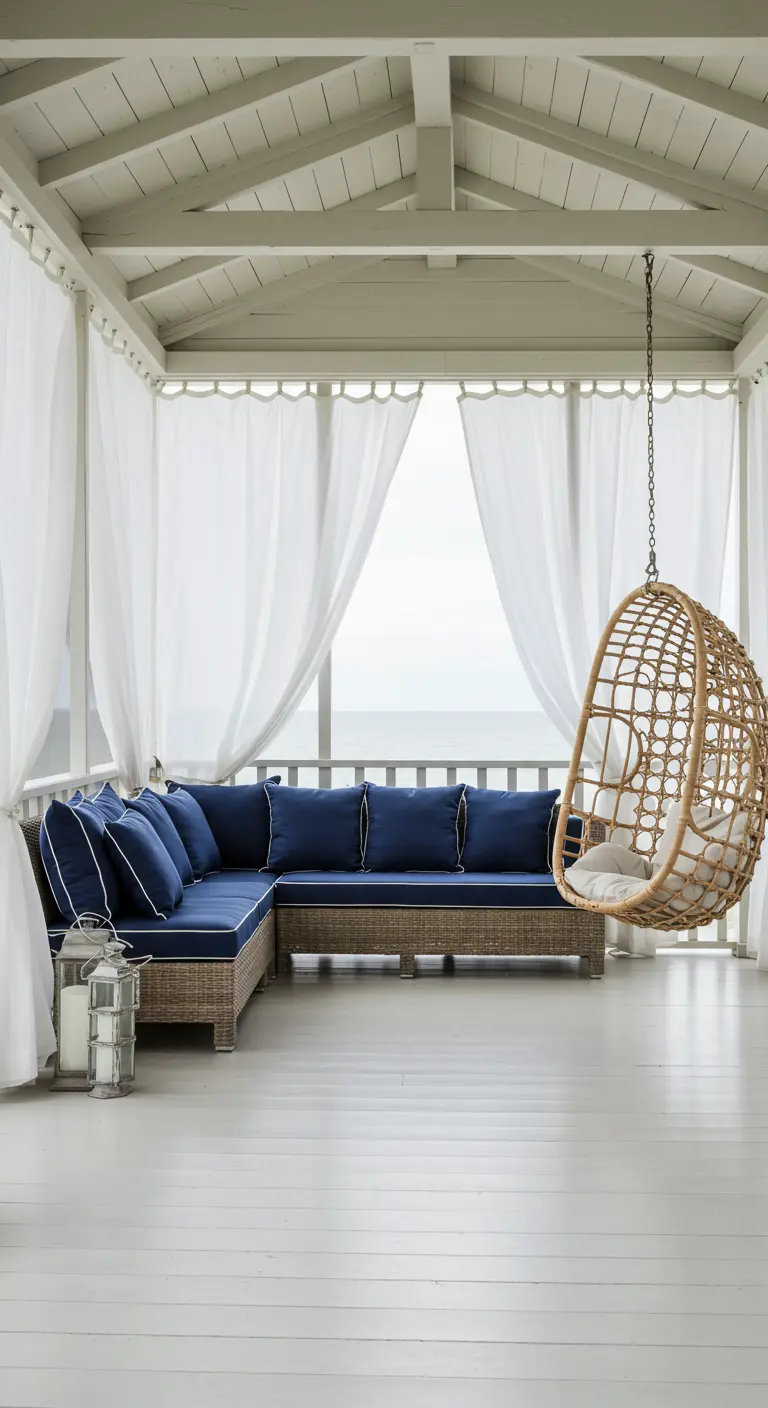
Define a covered porch or patio as a true outdoor living room by hanging drapes.
Sheer, weather-resistant curtains soften the hard lines of the architecture, add a sense of privacy, and create a beautiful, breezy movement.
They transform a simple porch into an elegant, protected enclave.
A hanging chair adds a playful, resort-like touch. Consider these for balcony gardens too.
27. Frame Your Best Feature

If you are lucky enough to have a beautiful view, make it the center of your design.
Position your sink directly in front of the window to make everyday tasks more pleasant.
Use a simple, large-format window with minimal framing to maximize the vista.
The cabinet color should complement, not compete with, the view—a soft, sky-like blue is a perfect choice.
28. Add Safety and Style with a Stair Runner
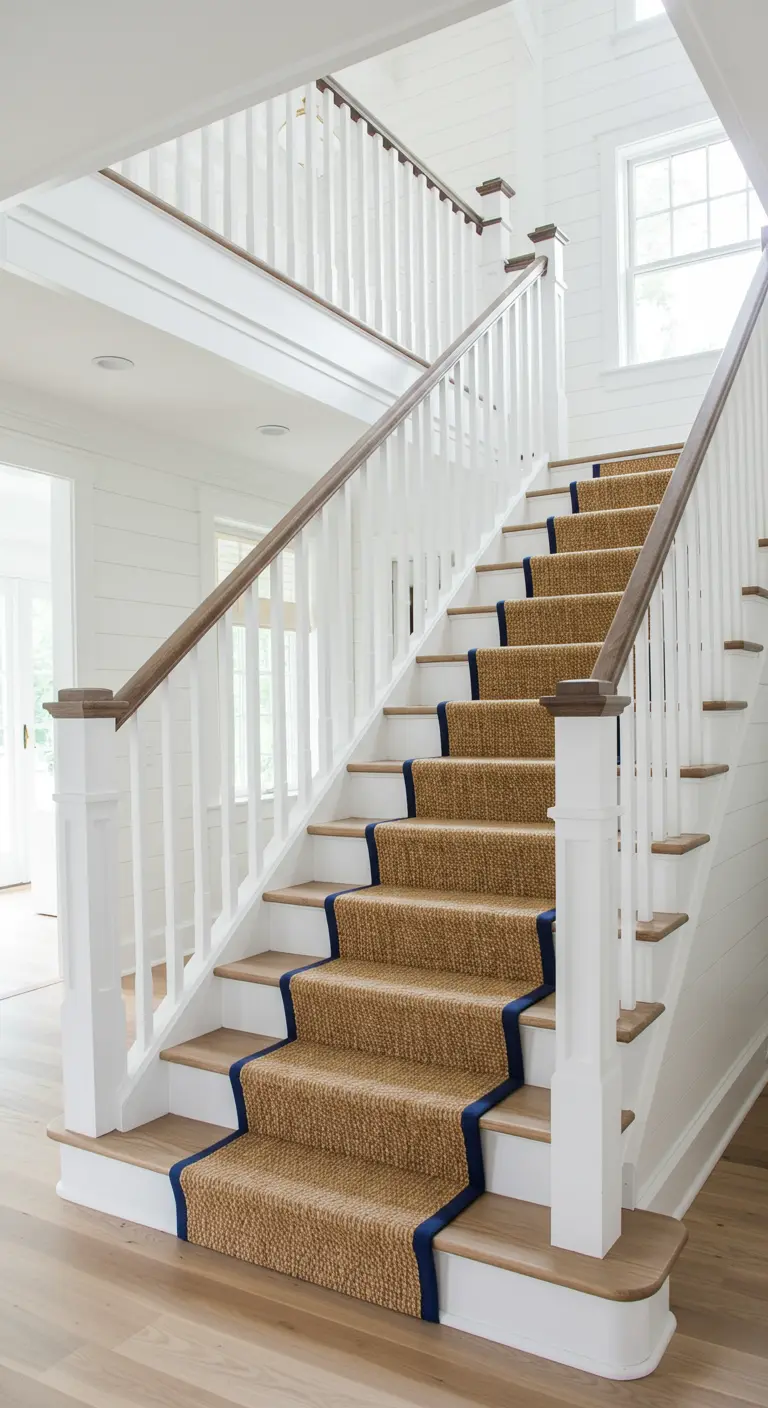
A runner is a smart addition to wooden stairs.
It provides better grip, muffles sound, and offers a chance to add color and texture.
A durable, natural fiber like jute or sisal is an excellent choice for a high-traffic area.
The contrasting navy border adds a crisp, tailored finish that elevates the entire staircase. You can also find inspiration in more festive staircase decor.
29. Use Distressed Finishes in Unexpected Places
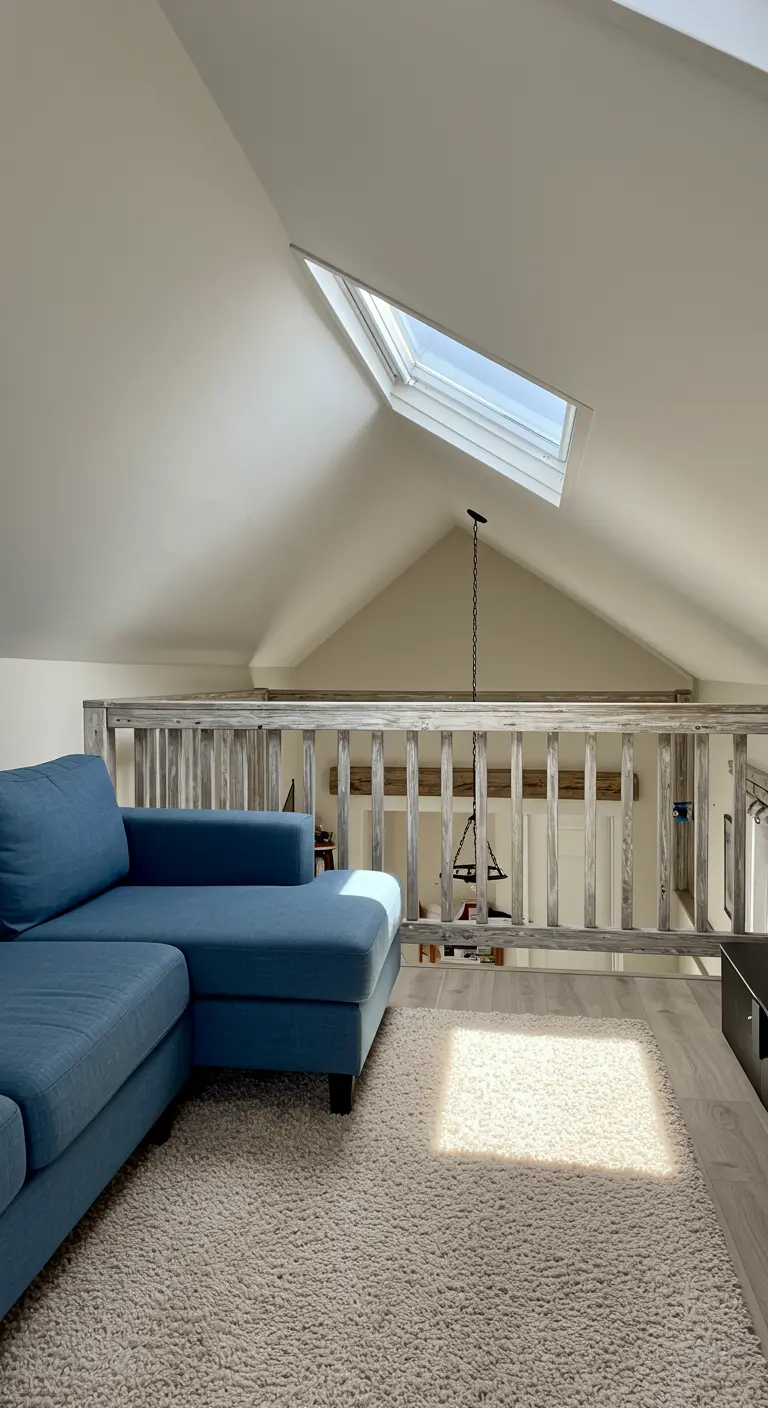
Bring character to modern architecture with a surprising textural element.
A distressed, whitewashed finish on an interior railing adds a layer of history and softness to this loft space.
It contrasts beautifully with the clean lines of the sofa and the smooth, angled walls, preventing the room from feeling one-note.
30. Make Your Mudroom an Organized Entry Point
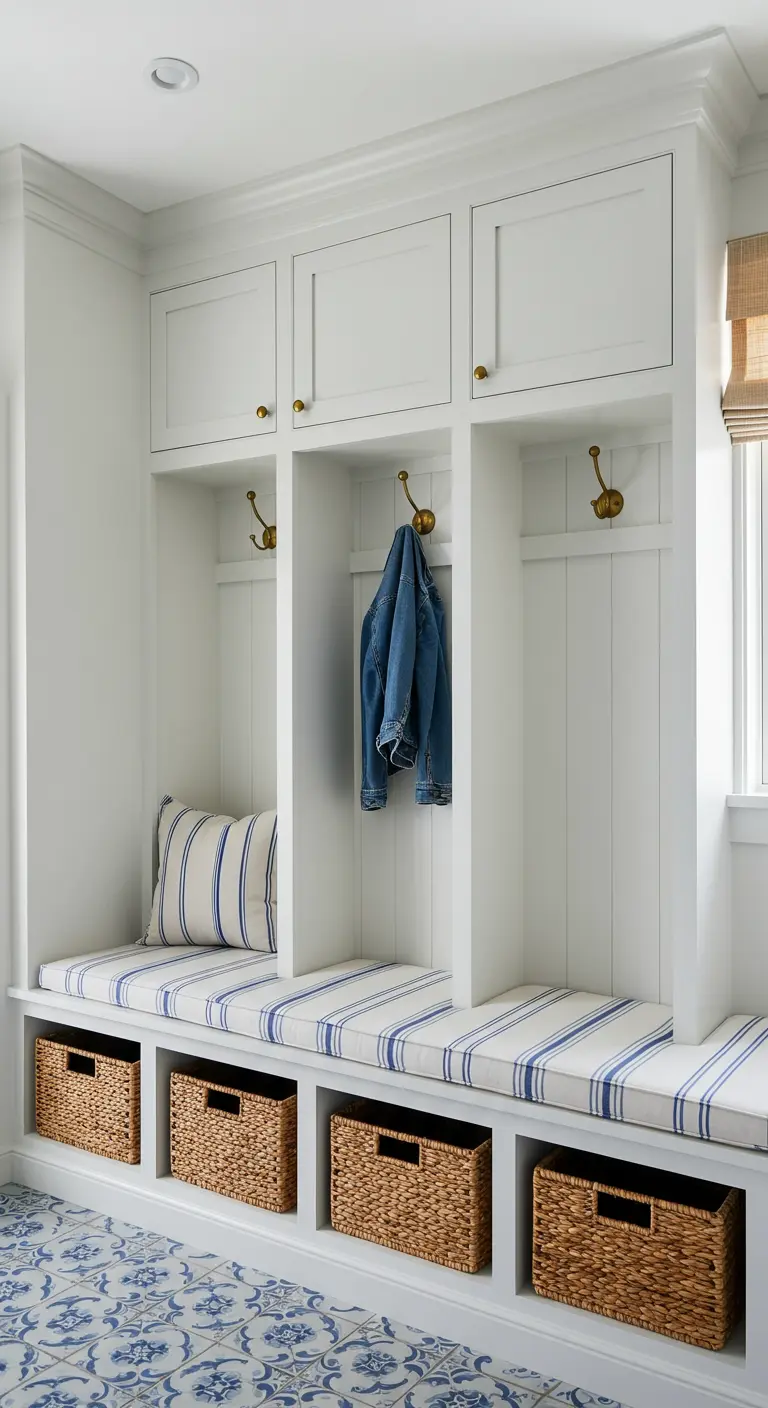
A well-designed mudroom can be a game-changer for a busy household.
Individual cubbies give each family member a designated spot for their belongings.
A bench makes putting on shoes easier, and baskets below hide clutter.
Don’t forget the floor—a beautiful, patterned tile is extremely durable and makes a stylish statement in this hardworking space. For a different take on entryways, explore these garden arch entrances.
31. Balance Scale with Softness
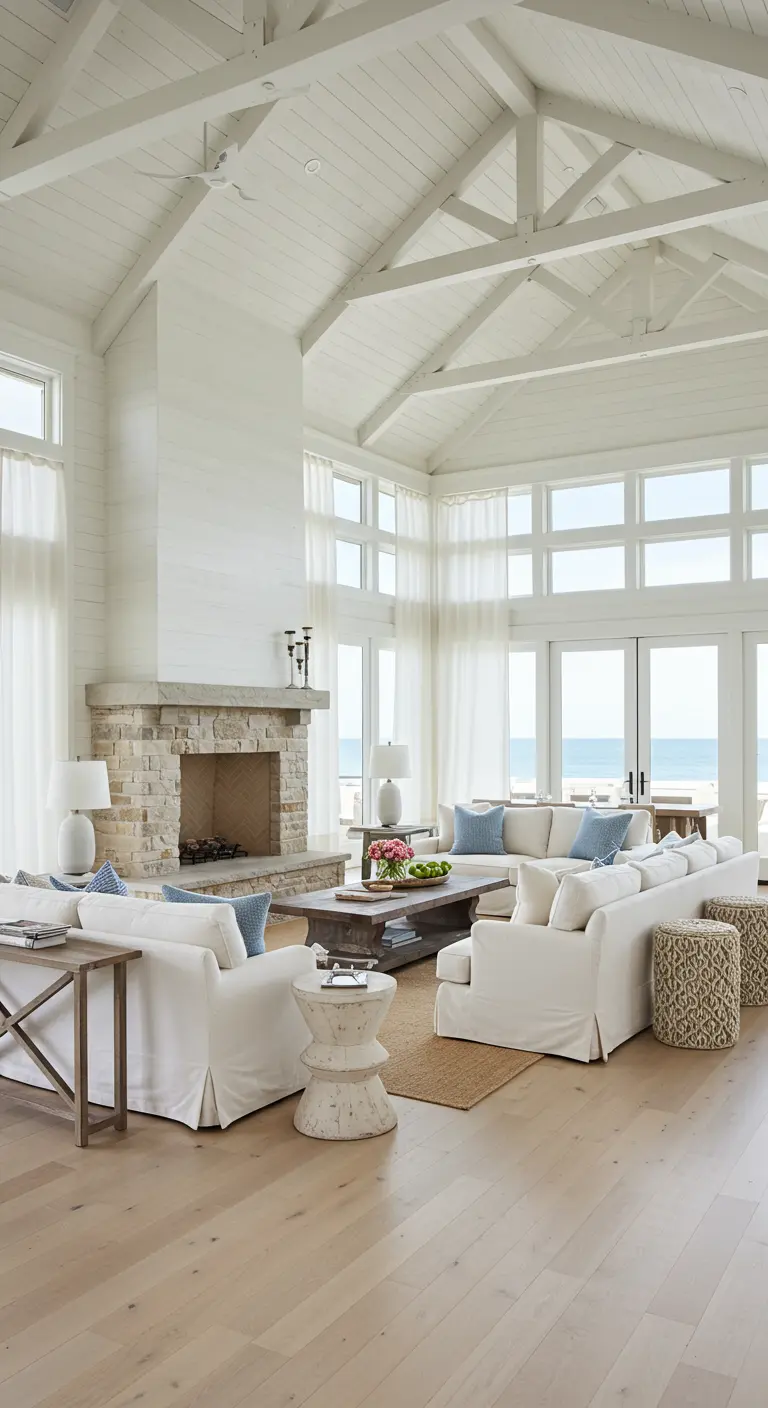
In a grand room with vaulted ceilings and a statement stone fireplace, it’s crucial to balance the scale with soft, comfortable furnishings.
Deep, plush slipcovered sofas invite relaxation and prevent the room from feeling like a formal lobby.
By keeping the color palette light and consistent—whites, creams, and natural wood tones—the focus remains on the incredible architecture and the view beyond.

